

Informative Essay
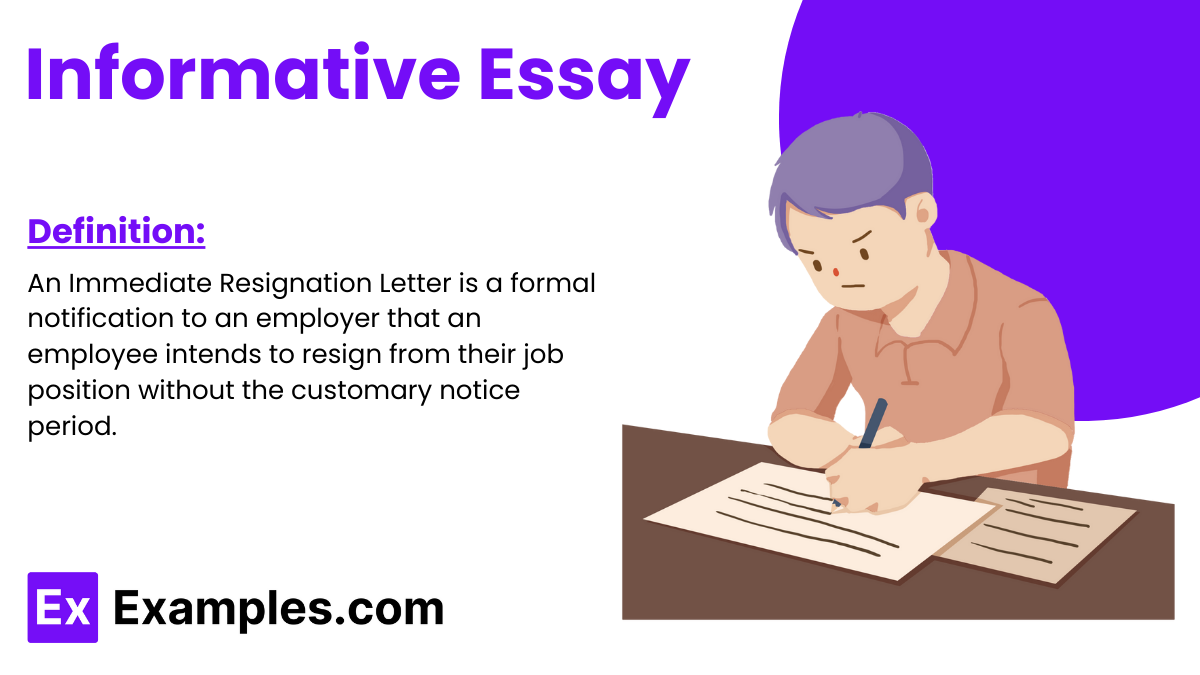
An Informative Essay stands out in the academic world as a tool for students to elaborate on specific topics with depth and clarity. By incorporating factual details and supporting evidence, these essays educate and enlighten the reader. This guide, enriched with practical essay examples , is tailored to assist students in mastering the art of crafting compelling and informative essays. Whether for school assignments or personal exploration, these examples provide valuable insights into effective informative essay writing.
What is an Informative Essay?
An informative essay is a genre of writing aimed at educating the audience on a particular topic or subject. This type of essay doesn’t just offer facts but also provides insights and explanations to help readers understand the subject matter more deeply. Unlike persuasive essays, which aim to convince readers of a particular viewpoint, informative essays are neutral; they do not express the writer’s personal opinions or arguments.
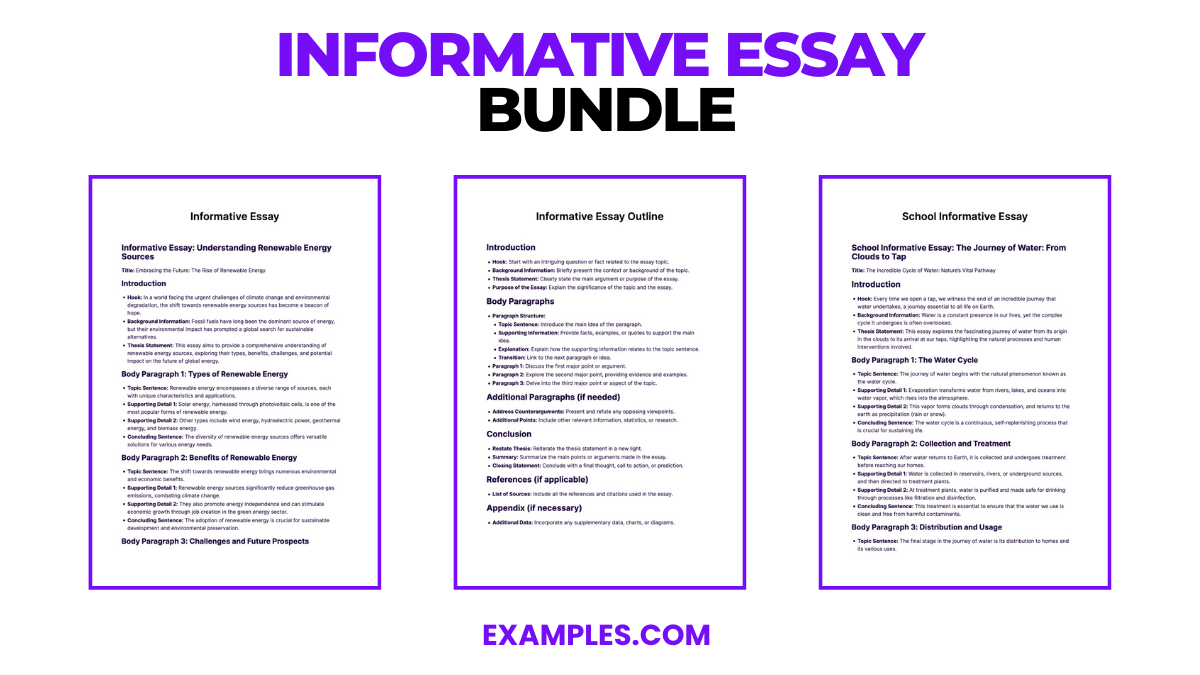
Download Informative Essay Bundle
You may have already been flooded with all these load of essays that your teacher asked you to write. You are probably thinking of a clever way on how to get away from the situation where you probably have not ever dreamed of. However, it is a task that we should all be thankful for. Essay writing actually brings more benefits than browsing through those social media platforms that you have already memorized. It does not only sharpen your minds and makes you more creative than putting likes and hitting shares of your friends’ post. The ability to share something from your mind is definitely a plausible act.
Informative Essay Format
Crafting an informative essay requires a structured approach to organize the wealth of information in a way that’s easily understandable to the reader. The format of an informative essay typically consists of three main parts: the introduction, the body, and the conclusion. Following this format helps in developing a coherent and logically flowing essay that effectively informs the reader.
Introduction
The introduction sets the stage for the entire essay. It should start with a hook that grabs the reader’s attention, such as a surprising fact, a question, or a vivid description of the topic. Following the hook, provide some background information to help readers understand the context of the essay. Finally, the introduction should end with a clear and concise thesis statement that outlines the main points or aspects of the topic that will be discussed. This statement acts as a roadmap for the essay, guiding the reader through the information presented.
Components of the Introduction: Hook : Engages the reader’s interest. Background Information : Provides context for the topic. Thesis Statement : Outlines the main points to be discussed.
Body Paragraphs
The body of an informative essay is where the main information is presented. It should be divided into paragraphs, with each paragraph focusing on a specific point or aspect of the topic. Start each paragraph with a topic sentence that introduces the point to be discussed. Follow this with supporting details, such as facts, examples, statistics, and quotes from credible sources. Each paragraph should be coherent and focused, contributing to the overall argument or presentation of the topic.
Structure of Body Paragraphs: Topic Sentence : Introduces the main idea of the paragraph. Supporting Details : Facts, examples, and evidence supporting the topic sentence. Transition : Smoothly connects to the next paragraph or point.
The conclusion of an informative essay wraps up the essay by summarizing the main points discussed. It should restate the thesis statement in a new way, reflecting the information presented in the essay. The conclusion can also highlight the importance or relevance of the topic, offering final insights or thoughts for the reader to consider. This section should leave the reader with a clear understanding of the topic and its significance. Elements of the Conclusion: Restatement of Thesis : Reflects the main points made in the essay. Summary of Main Points : Briefly recaps the key information discussed. Final Insight : Offers closing thoughts or implications of the topic.
Formatting Tips:
Use clear and concise language throughout the essay. Ensure each paragraph flows logically to the next. Cite sources where necessary to back up facts and claims. Keep the essay focused on informing the reader, avoiding personal opinions.
Types of Informative Essay
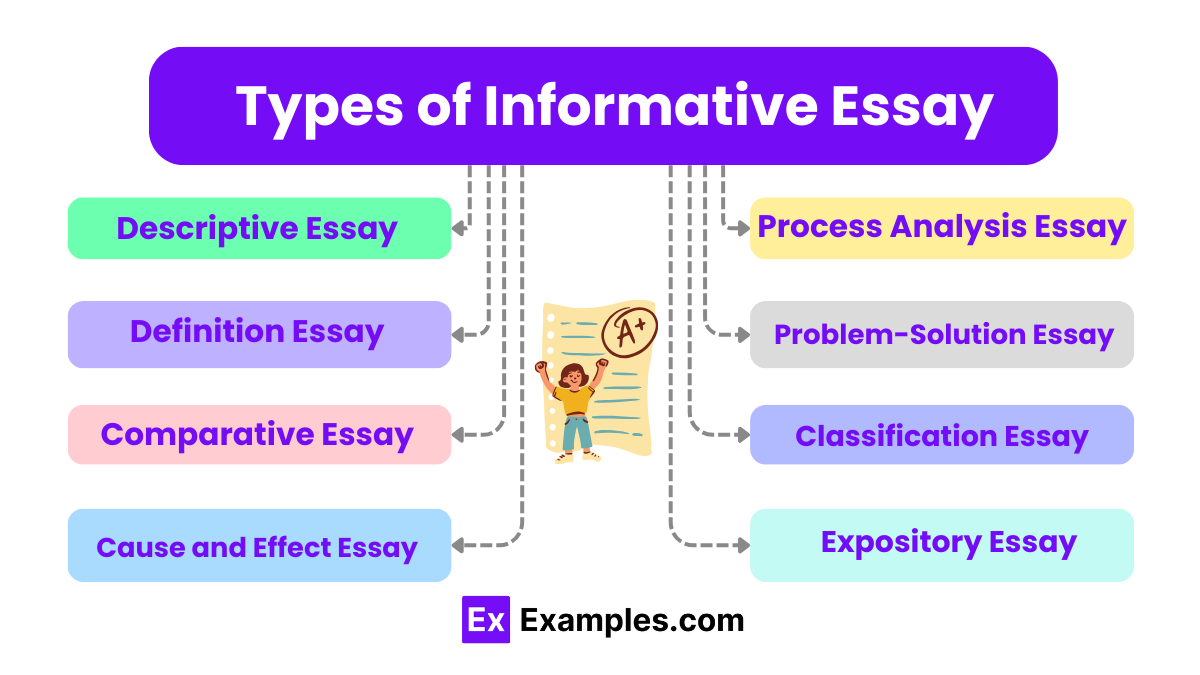
Download This Image
- Descriptive Essay : Provides a detailed description of a person, place, object, or event, using sensory details to paint a vivid picture for the reader.
- Definition Essay : Explores the meaning, history, and implications of a complex concept or term, offering a deep and thorough understanding beyond basic definitions.
- Compare and Contrast Essay : Analyzes two or more subjects by comparing their similarities and contrasting their differences, highlighting the nuances between them.
- Cause and Effect Essay : Examines the reasons why something happened (cause) and the outcomes that followed (effect), aiming to establish a clear relationship between events.
- Process Analysis Essay : Explains how something is done, how something occurs, or how something works, in a step-by-step format, providing clear instructions or insights.
- Problem-Solution Essay : Identifies a specific problem and proposes one or more solutions, focusing on presenting viable and effective ways to address the issue at hand.
- Classification Essay : Organizes or sorts different subjects or objects into categories based on shared characteristics, providing a clear understanding of their relationships and differences.
- Expository Essay : Presents a balanced analysis of a topic, using facts, statistics, and examples, aiming to explain or clarify a subject in a straightforward, unbiased manner.
How is an Informative Essay Structured?
An informative essay is structured in a clear, organized manner to effectively convey information to the reader. This structure consists of three main parts: the introduction, the body paragraphs, and the conclusion. Here’s how each part is typically organized:
- Hook : Begins with a captivating opening to grab the reader’s attention. This could be an interesting fact, a question, or a startling statistic related to the topic.
- Background Information : Provides context for the topic being discussed. This section gives the reader any necessary background information to understand the essay.
- Thesis Statement : Concludes the introduction with a clear, concise statement that outlines the main points or focus of the essay. This statement guides the rest of the essay.
- Topic Sentence : Each body paragraph starts with a topic sentence that introduces the main idea of the paragraph, relating back to the thesis statement.
- Supporting Details : These are facts, examples, or explanations that provide evidence to support the topic sentence. This may include statistics, quotes from credible sources, or logical arguments.
- Analysis : This section interprets the supporting details, explaining how they relate to the topic and the thesis statement. It’s where the writer’s insight comes into play, providing depth to the information presented.
- Transition : Each paragraph ends with a sentence that provides a smooth transition to the next paragraph, maintaining the flow of the essay.
- Summary of Main Points : Begins by briefly summarizing the key points or information presented in the body paragraphs, reinforcing the essay’s main ideas.
- Restatement of the Thesis : Reiterates the thesis statement in light of the information and analysis provided, emphasizing the essay’s main argument or focus.
- Closing Statement : Concludes with a final thought or call to action, leaving the reader with something to ponder or suggesting steps for further exploration of the topic
7 steps for Writing an Informative Essay
- Choose Your Topic : Select a topic that interests you and meets the assignment’s criteria. Ensure it is broad enough to research but narrow enough to be covered in your essay.
- Conduct Research : Gather information from reliable sources to understand your topic thoroughly. Look for facts, statistics, and examples that will provide a solid foundation for your essay.
- Create an Outline : Organize your thoughts and research into an outline. This will help structure your essay logically, ensuring a clear flow of ideas from the introduction through the body paragraphs to the conclusion.
- Write the Introduction : Begin with a hook to capture the reader’s interest, followed by background information to set the context for your topic. Conclude the introduction with a thesis statement that presents the main focus or argument of your essay.
- Develop Body Paragraphs : Each paragraph should focus on a single main idea that supports your thesis. Start with a topic sentence, followed by evidence and examples. Include your analysis to explain how this evidence relates to your topic.
- Conclude Your Essay : Summarize the main points of your essay, restate your thesis in light of the information provided, and offer a final thought or call to action. This is your chance to reinforce the importance of your topic and the information you’ve presented.
- Revise and Edit : Review your essay for any errors or unclear parts. Check for grammar, punctuation, and spelling mistakes. Ensure your writing is clear, concise, and logically organized. It may help to get feedback from others or to step away from your essay for a while before reviewing it again.
Purpose of Informative Essays
Informative essays serve a foundational role in educational and communication contexts, aiming to enlighten the reader on a specific topic or subject matter. The core purpose of these essays is to inform, explain, and educate without presenting the author’s opinion or persuading the reader to adopt a particular viewpoint. Here’s a deeper look into the primary objectives of informative essays:
Educate the Reader
The most direct purpose of an informative essay is to educate its audience. By presenting facts, data, and detailed explanations, the essay seeks to expand the reader’s knowledge on a given subject. This is particularly valuable in academic settings, where understanding diverse topics is essential to a well-rounded education.
Provide Clarity and Insight
Informative essays often tackle complex subjects that may be difficult to understand at first glance. Through clear writing and structured explanation, these essays break down intricate concepts into digestible parts, offering insight and clarity. They help the reader grasp the nuances of topics ranging from scientific theories to historical events and beyond.
Enhance Critical Thinking
By presenting information from various angles and including detailed analyses, informative essays encourage readers to engage in critical thinking. Readers are prompted to consider the hows and whys of the subject matter, analyze the information presented, and connect it to broader contexts or their personal knowledge.
Stimulate Interest
Although the primary aim is to inform, a well-crafted informative essay can also spark interest in the topic. By uncovering intriguing facts or presenting the subject in a compelling manner, the essay can motivate readers to explore the topic further on their own, fostering a culture of learning and curiosity.
Support Academic and Professional Success
In academic settings, informative essays are a tool for students to demonstrate their understanding of a topic, their ability to conduct thorough research, and their proficiency in communicating complex ideas. Professionally, these essays contribute to knowledge sharing within industries, helping individuals stay informed about current trends, innovations, and foundational concepts.
Build Foundation for Further Exploration
Informative essays lay the groundwork for deeper research and exploration. By providing a comprehensive overview of a topic, they equip readers with the basic knowledge necessary to delve into more specialized studies or related subjects, serving as a stepping stone for academic and personal growth.
10+Informative Essay Samples
15+ informative essay examples.
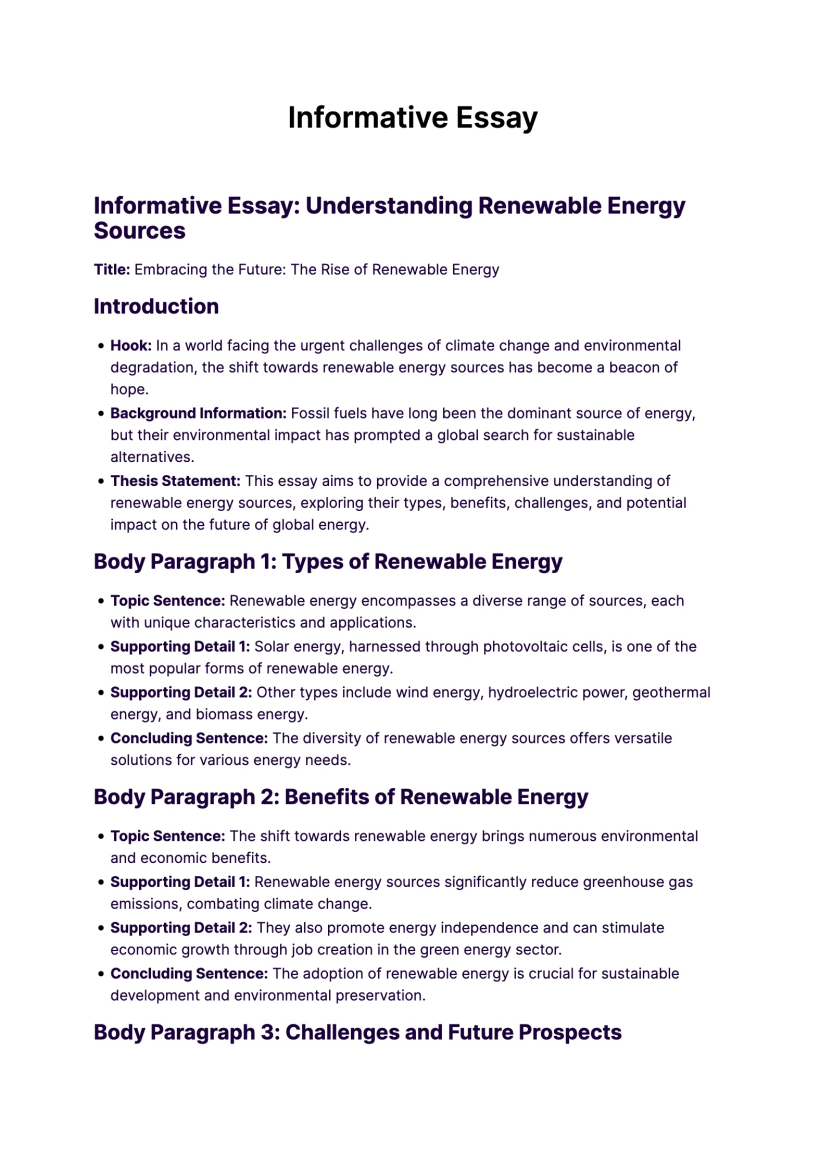
Free Download
Informative Essay Outline
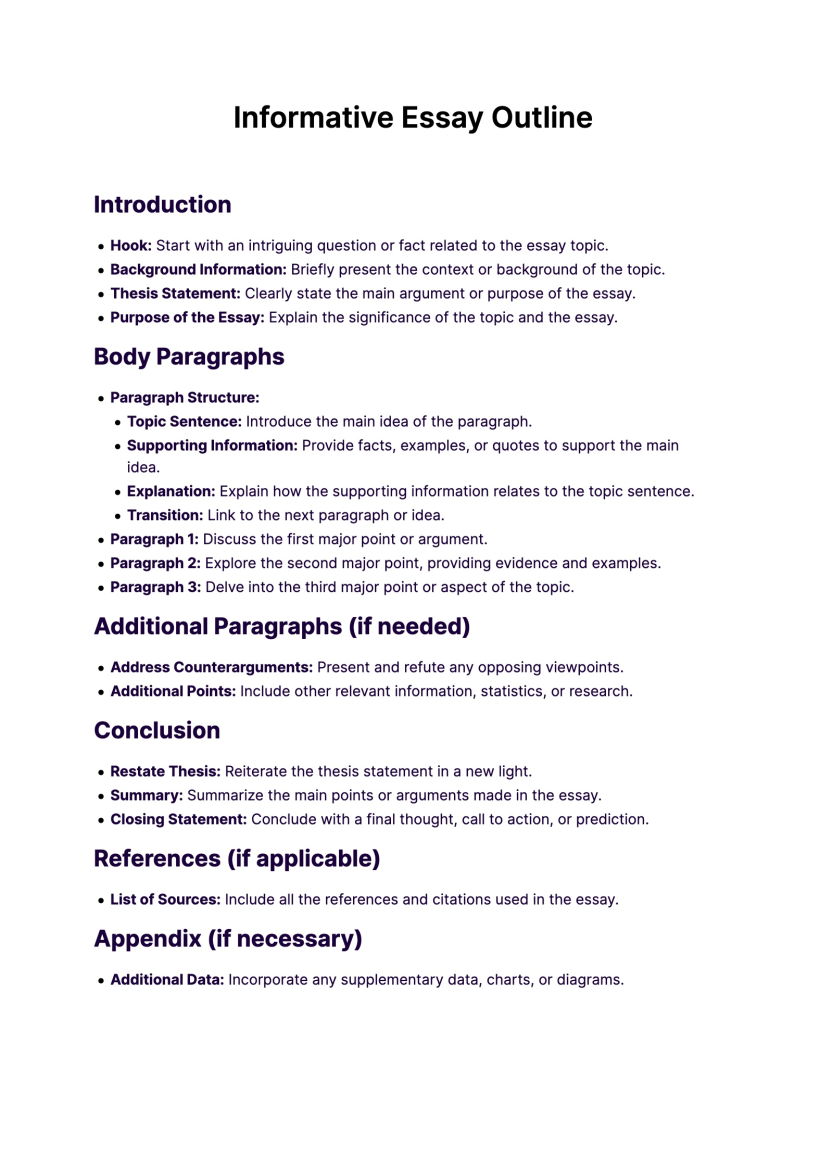
School Informative Essay
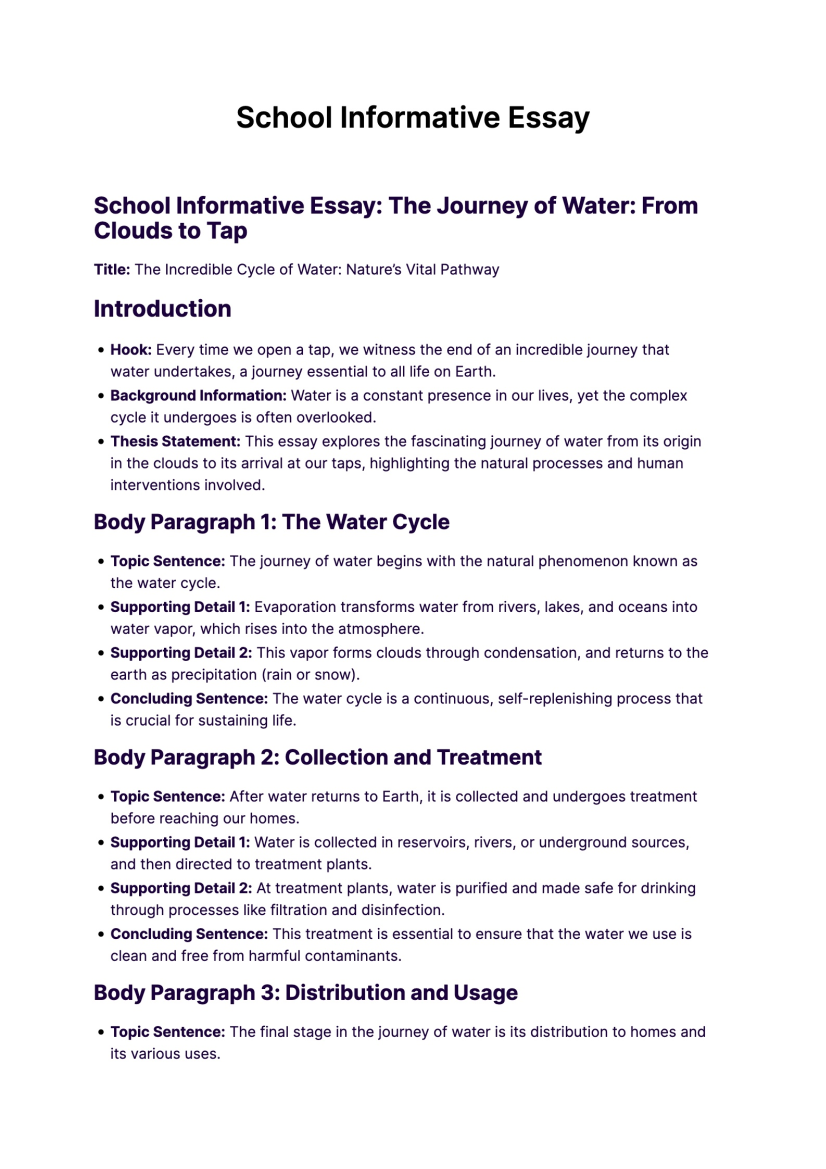
Informative Essay Example
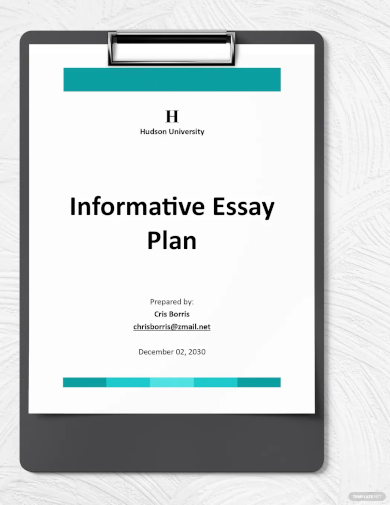
Expository Informative Example
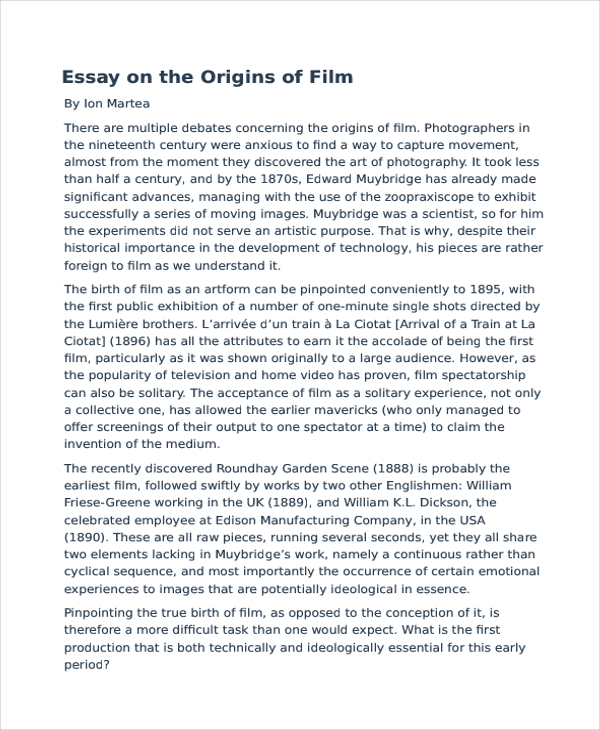
Student Informative Sample
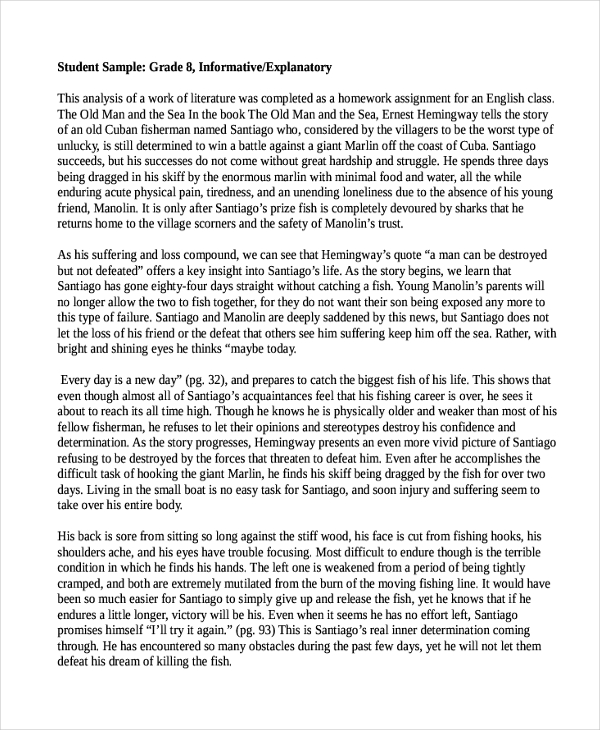
Short Informative Essay
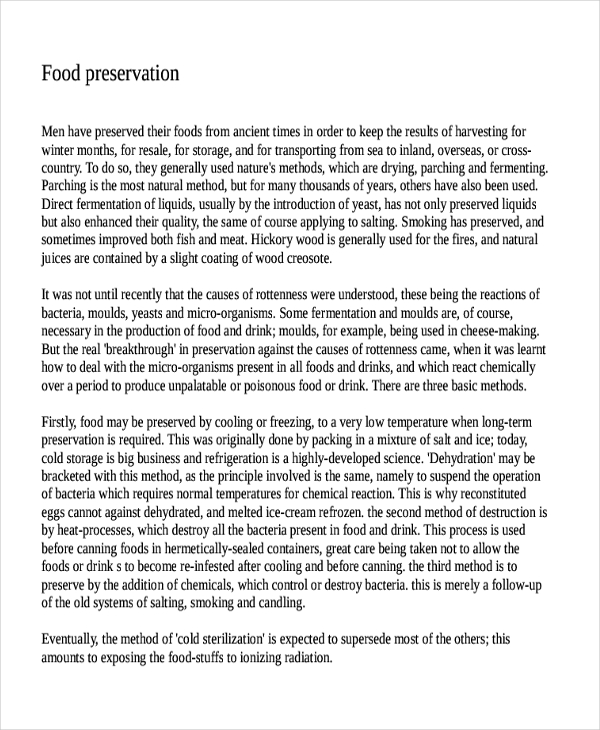
What Is an Informative Essay?
Informative essay is a written as literary essay piece with the purpose of educating a target audience or readers regarding a certain topic or subject.
It is intended to present or expose something while at the same time avoiding to present arguments or personal opinion from the writer. An informative essay is also sometimes called an expository essay in the sense that it also aims to expose or display an information which will be beneficial for the reader.
It does not present bias judgments nor favorable ideas. It does not also dwell in the concept of convincing readers to do things that are contrary to their will.
How to Write an Informative Essay
Writing an informative essay is like telling a blind person what is the color of the sky or telling a kid what are ice creams made of. You simply just have to present a topic and expand.
- Think of a topic. The first thing that you have to do is think of a topic that you want to right about. It would be good if it is something that you are most passionate about so you can write in great details.
- Create a format. The most effective format is using the essential parts of an essay .
- Present your ideas. After choosing the topic, start writing your ideas. Try to present it in a way that you are educating the readers.
College Informative Essay
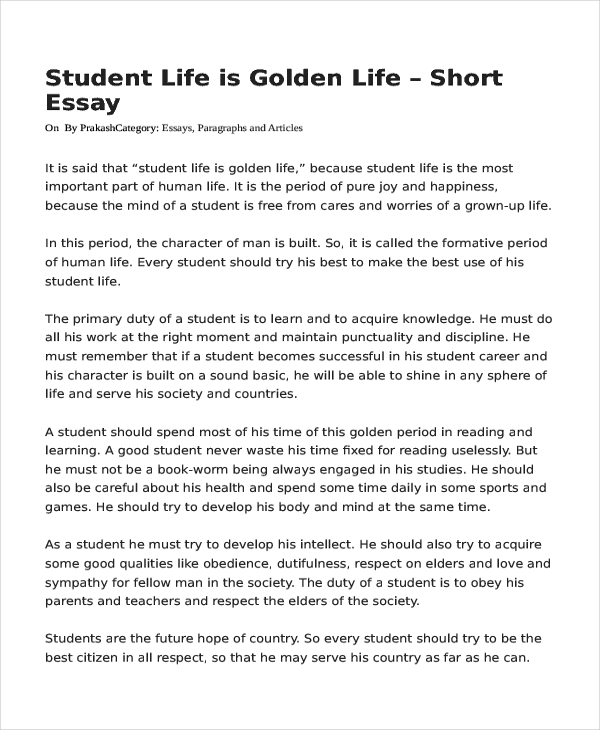
Middle School Informative

Narrative Informative Example
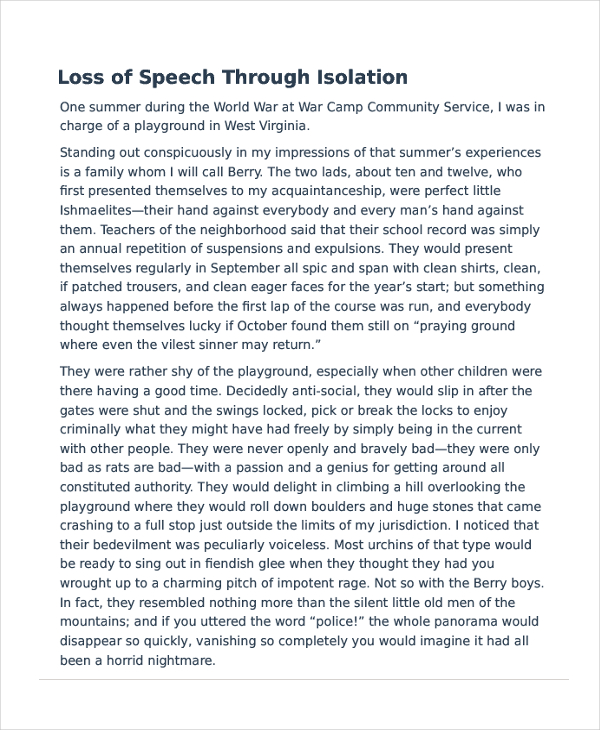
Informative Essay Example
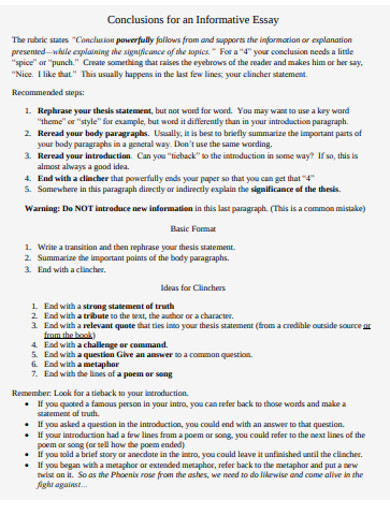
Sample Informative Essay
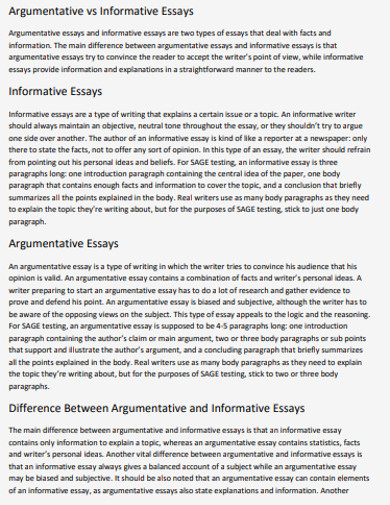
Informative Organizer Essay
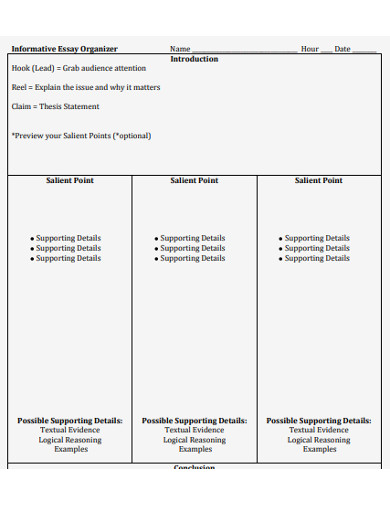
Informative Assignment Essay
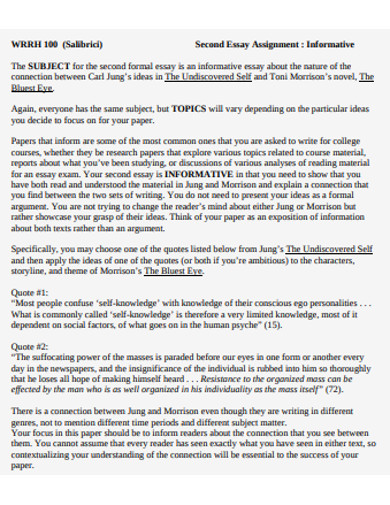
Uses of Informative Essay
1. educational tools.
- Learning and Teaching : Informative essays are widely used in educational settings to teach students about specific topics. They serve as a means for students to research, organize, and present information, enhancing their learning process. For educators, these essays are a tool to assess students’ understanding and ability to communicate knowledge effectively.
2. Enhancing Understanding
- Complex Concept Clarification : These essays break down complex concepts into more understandable parts, making it easier for readers to grasp difficult subjects. They can demystify scientific principles, historical events, or technological advancements, providing clarity and insight.
3. Communication of Ideas
- Knowledge Sharing : In professional and academic communities, informative essays facilitate the sharing of knowledge and ideas. They allow experts to communicate findings, theories, and analyses, contributing to the collective understanding of a field.
4. Awareness and Information Dissemination
- Public Awareness : Informative essays play a crucial role in raising awareness about important issues, such as health, environmental concerns, and social justice. By presenting facts and information, they help inform public opinion and encourage informed decision-making.
5. Basis for Further Research
- Foundation for Exploration : These essays provide a foundation for further research. By offering a comprehensive overview of a topic, they can inspire readers to explore subjects in greater depth, paving the way for advanced studies and discoveries.
6. Professional Development
- Skill Enhancement : Writing informative essays helps individuals develop valuable skills, including research, critical thinking, organization, and writing. These skills are essential in many professional contexts, enhancing career prospects and professional competence.
7. Decision Making and Problem Solving
- Informed Decisions : In the business world and personal life, informative essays can provide the necessary background to make informed decisions. Understanding all aspects of a situation or topic can lead to better problem-solving strategies and outcomes.
8. Cultural and Social Engagement
- Cultural Insight : Essays about cultural practices, societal trends, and historical backgrounds offer readers insights into different ways of life and perspectives, promoting cultural understanding and empathy.
9. Personal Growth
- Intellectual Stimulation : Reading and writing informative essays can be intellectually stimulating, encouraging curiosity and a love for learning. They can broaden one’s horizons and foster a more informed and thoughtful perspective on the world.
Importance of Informative Essay
- Facilitates Learning and Education : They are essential tools in educational settings, helping students learn and understand various topics across different subjects.
- Promotes Critical Thinking : Writing and reading informative essays encourage critical thinking by requiring analysis and synthesis of information.
- Enhances Research Skills : The process of writing an informative essay improves research skills, teaching individuals how to gather, evaluate, and organize information effectively.
- Improves Writing and Communication Skills : Informative essays help in honing writing skills, including structuring arguments, maintaining clarity, and engaging the audience with informative content.
- Encourages Intellectual Curiosity : They stimulate curiosity about the world, encouraging readers and writers to explore topics deeply and broadly.
- Supports Informed Decision Making : By presenting facts and data, informative essays enable readers to make decisions based on knowledge and insights rather than assumptions or misinformation.
- Builds a Foundation for Further Study : They lay the groundwork for more in-depth research and analysis, serving as a stepping stone to more specialized studies.
- Spreads Awareness on Important Issues : Informative essays are a powerful medium for raising awareness about social, environmental, and health-related issues, contributing to public education and action.
- Promotes Cultural Understanding and Empathy : Essays on cultural and societal topics promote understanding and empathy towards different communities and ways of life.
- Contributes to Professional Development : The skills gained from researching and writing informative essays are valuable in professional settings, enhancing abilities in documentation, presentation, and critical analysis.
- Serves as a Source of Inspiration : Reading informative essays can inspire new ideas, hobbies, or even career paths by introducing readers to previously unknown subjects or deeper aspects of familiar topics.
- Facilitates Clear and Effective Information Dissemination : In both academic and professional contexts, the ability to clearly and effectively disseminate information is critical, and informative essays are an excellent medium for this purpose.
How Do You Start an Informative Essay Sentence?
Start an informative essay sentence with a hook such as a surprising fact, a question, or a quote to grab the reader’s attention and draw them into the topic.
How Do You Structure an Informative Essay?
Structure an informative essay with an introduction that includes a hook and thesis statement, body paragraphs that explore the topic in detail, and a conclusion that summarizes the main points.
What Should Each Body Paragraph Begin With?
Each body paragraph should begin with a topic sentence that introduces the main idea of the paragraph, directly supporting the thesis statement.
What Are the Informative Writing Techniques?
Informative writing techniques include using clear and concise language, organizing information logically, employing facts and data for support, and incorporating visuals like charts or graphs to enhance understanding.
How Do You Start an Informative Letter?
Start an informative letter with a polite greeting, followed by a clear introduction of the purpose of the letter. Provide the necessary information in a concise and organized manner.
What Are the Parts of an Informative Essay?
The parts of an informative essay include the introduction with a hook and thesis statement, body paragraphs with topic sentences and supporting details, and a conclusion that summarizes the essay’s main points.
The basic parts or elements of an essay are the introduction, the body, and the conclusion. These are all important parts which of course constitutes the wholeness of your essay.
So each part has to be given with special importance. The conclusion of essay , which is the last part, should be your chance to make your readers understand the whole point of your topic.
This is the chance for you to clarify some important things that you want to highlight. It is advisable that you write at least three to five sentences for your conclusion in order for it not to become too explanatory which you have already done on the previous part.

Informative Essay Generator
Text prompt
- Instructive
- Professional
Crafting the Perfect Thesis for Your Informative Essay
How to Research Effectively for an Informative Essay
Structuring Your Informative Essay: A Step-by-Step Guide
Selecting the Best Topic for Your Informative Essay
The Importance of Editing Your Informative Essay
Incorporating Visuals into Your Informative Essay
Tips for Writing an Engaging Informative Essay Introduction
Developing Strong Arguments in Your Informative Essay
Informative Essay Conclusion: Leaving a Lasting Impression
Avoiding Plagiarism in Your Informative Essay
- Grades 6-12
- School Leaders
FREE Book Bracket Template. For March and Beyond!
70+ Fascinating Informative Essay Topics for Kids and Teens
Tell them what you know.

Informative essays are a chance to show what you know. They’re all about informing the reader, without trying to persuade or offer an opinion. Informative writing can include how-to process essays, biographical writing, an in-depth analysis of a topic, research papers, or compare-and-contrast essays . Just remember to stick to the facts, and be clear and descriptive. These informative essay topics offer something for all interests and ages.
How-To Informative Essay Topics
Social studies informative essay topics, science informative essay topics, pop culture informative essay topics.
Teach your reader the steps or process to:
- Cook a recipe
- Set a table
- Make a quilt
- Change a tire
- Start a recycling program
- Play a game
- Build a birdhouse
- Plant a garden
- Make and care for a compost pile

- Care for an animal
- Start a business
- Catch a fish
- Tie a necktie
- Train for a marathon
- Prepare a campsite
- Make a campfire
- Clean a room
- Wrap a gift
- Plan a party
- Kick a bad habit
- Use social media responsibly
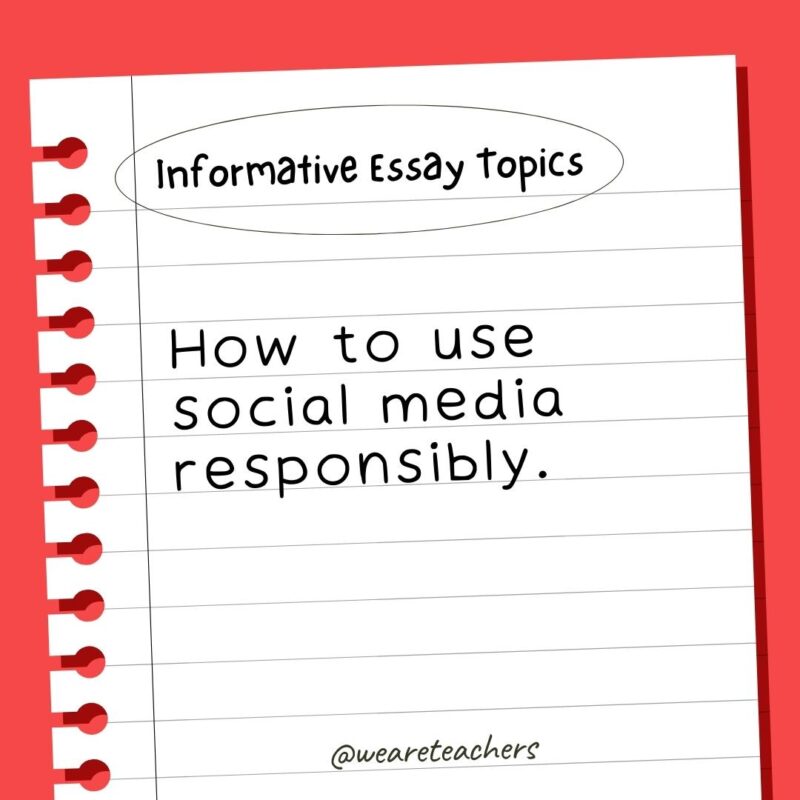
- Manage time effectively
- Make a budget
- Describe the life of a world leader.
- How has the role of women in the workplace changed in the last hundred years?
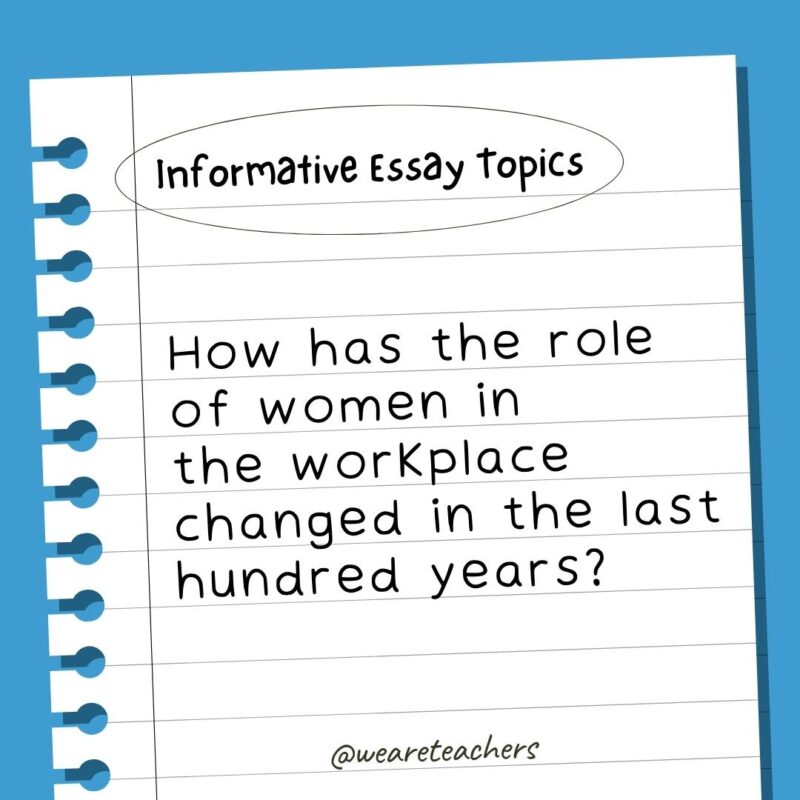
- Explore the current path to becoming an American citizen.
- What are some of the possible ways the pyramids were built?
- Describe a time period in history.
- How does one country’s economy affect another country?
- What is the difference between socialism and communism?
- Explore the benefits and drawbacks of legalizing drugs.
- Describe the political system in a foreign country.
- Explore the causes of a specific war or armed conflict in history.
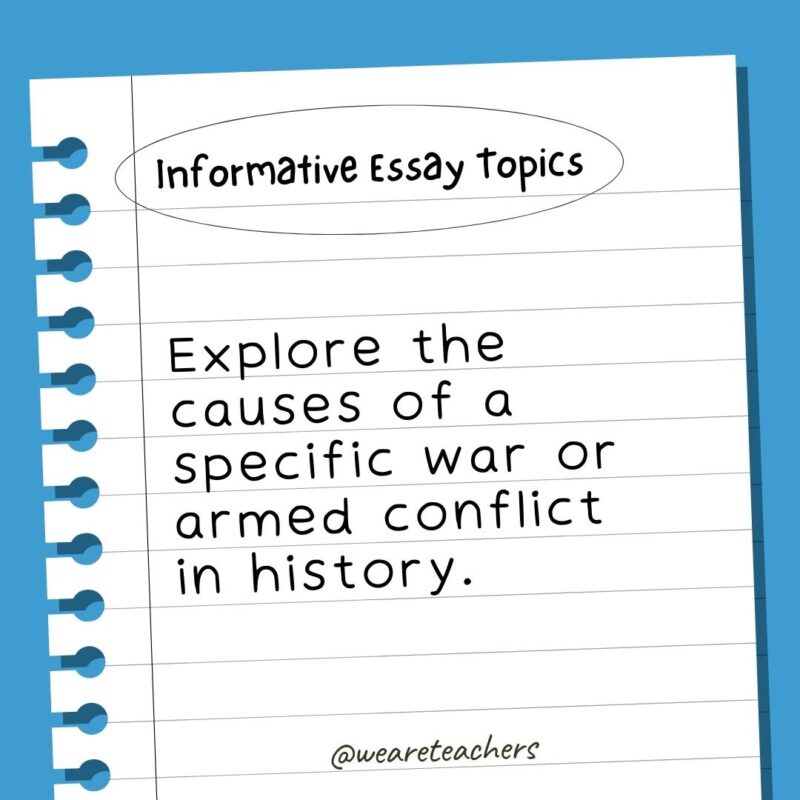
- How is a new law passed in the United States?
- Give an overview of the history of any country, state, or city.
- Describe the three branches of American government.
- Explain how the American judicial system works.
- Describe the evolution of fashion throughout history.
- Describe a science experiment, including the hypothesis, process, and conclusion.
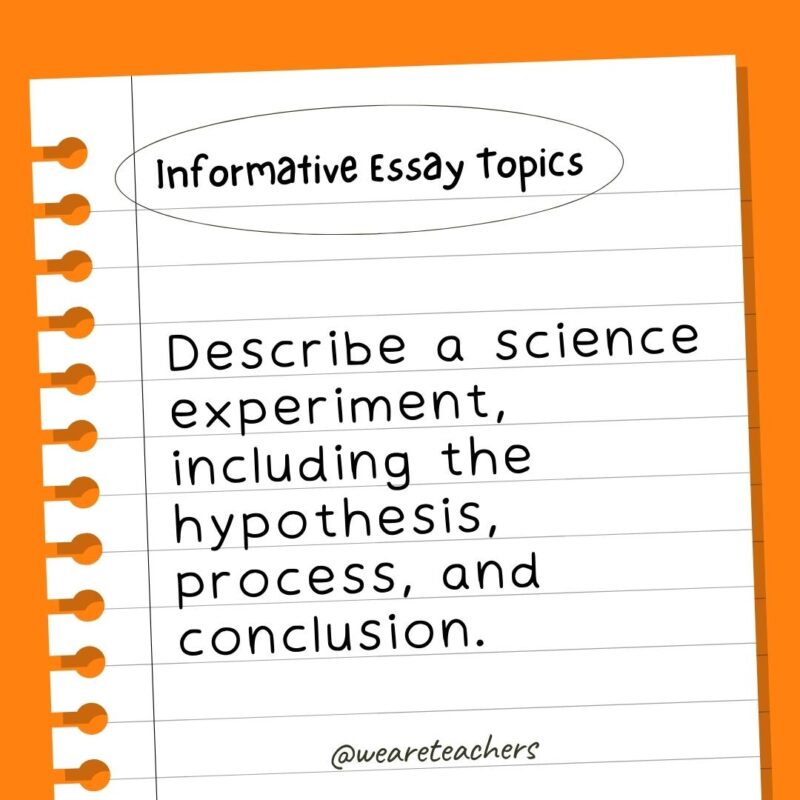
- Explain what it means to lead a healthy lifestyle.
- What is the relationship between calories and fat?
- What is the physics behind a bicycle?
- How do plants convert sunlight into energy?
- Describe any element from the periodic table, including its makeup and uses.
- What is the difference between a crocodile and an alligator?
- Describe the life cycle of any animal.
- What are the benefits of recycling?
- Describe the life of a prominent scientist.
- Explain what E = mc 2 means.
- Describe any disease, including its symptoms and treatments.
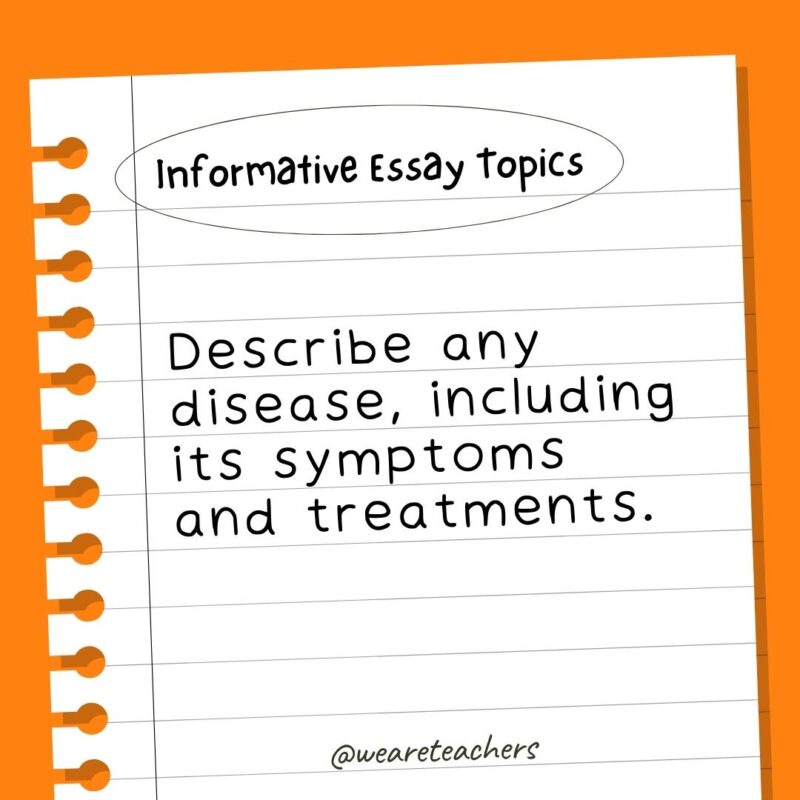
- Why do leaves change color in the fall?
- Explain the difference between climate and weather.
- Describe a specific ecosystem, including the plants and animals that live there.
- Describe the history of video games.
- What are recent trends in the video game industry?
- Describe your favorite superhero.
- Explain the motivations of any fictional villain.
- Describe the life of your favorite celebrity.
- Explore the development and growth of a main character in any book series.
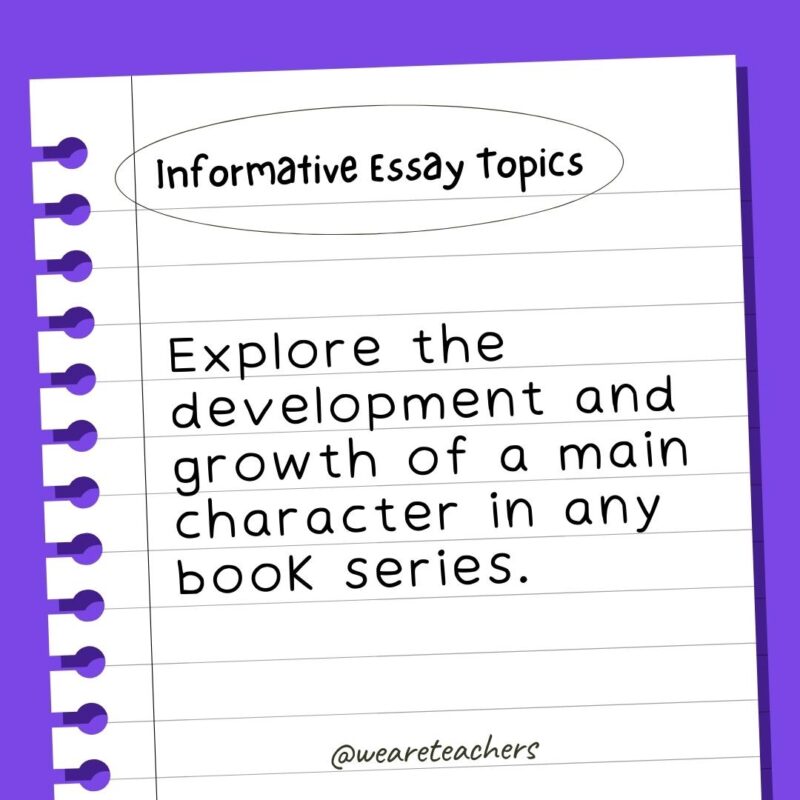
- Describe the process of making a movie or TV show.
- Tell the story of any band, including its founding, successes and challenges, and breakup (if applicable).
- Describe the life of a famous artist.
- Explore the history of Disney World (or any theme park).
- Plan the perfect fantasy football league team.
- Describe popular trends and fads from any decade.
- Explore the history of the Olympics.
- Describe the music of a generation and how it reflected that time.
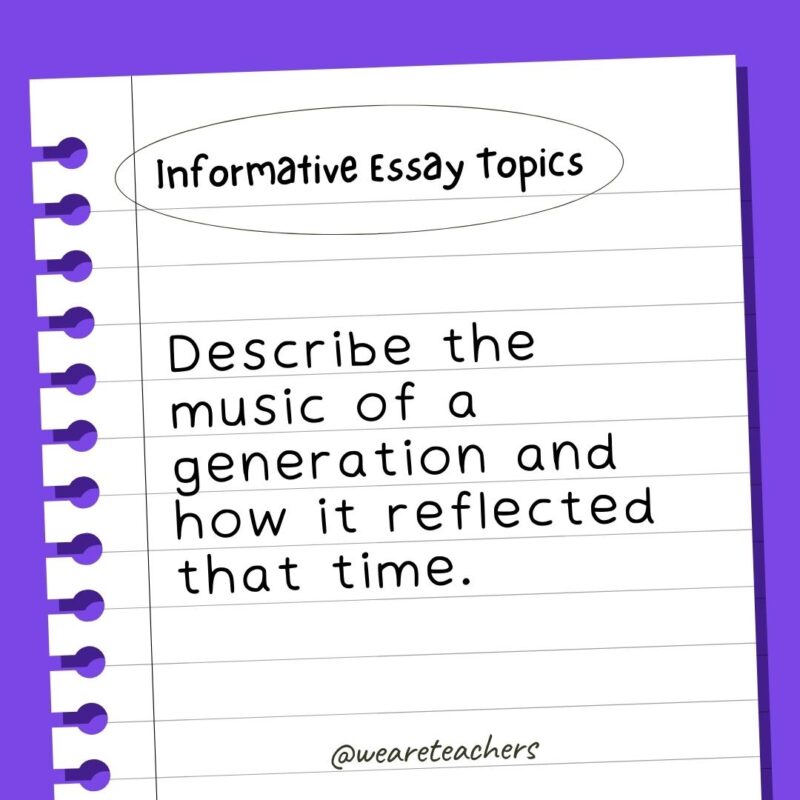
- Explain the history of the internet.
What are some of your favorite informative essay topics? Come share your ideas in the WeAreTeachers HELPLINE group on Facebook .
Plus, check out the big list of essay topics for high school (100+ ideas).
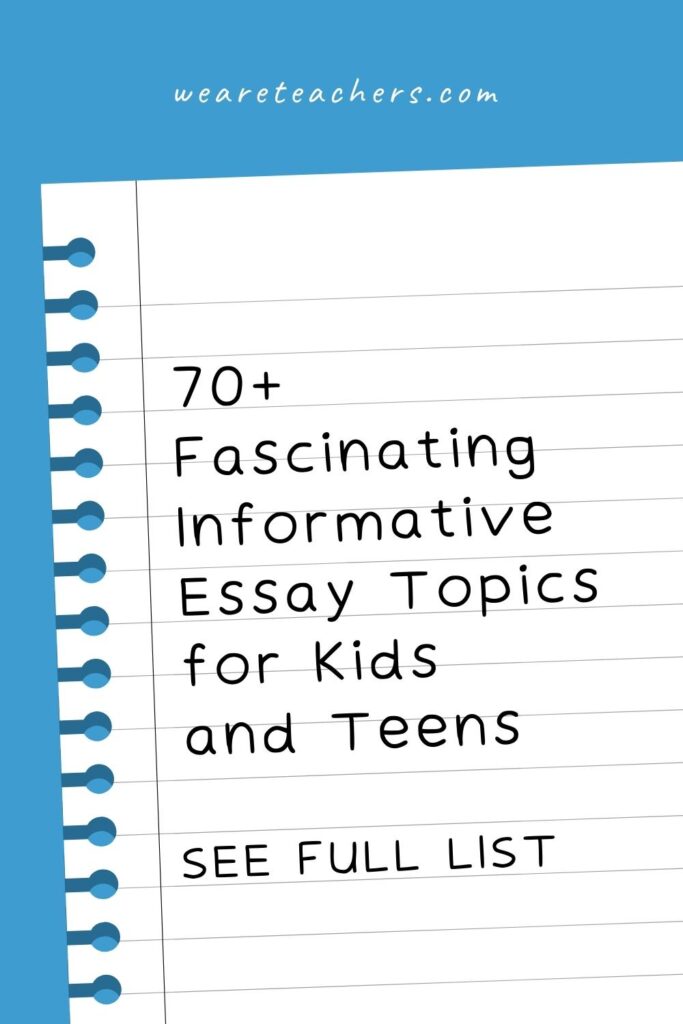
You Might Also Like

The Big List of Essay Topics for High School (120+ Ideas!)
Ideas to inspire every young writer! Continue Reading
Copyright © 2023. All rights reserved. 5335 Gate Parkway, Jacksonville, FL 32256

Informative Essay Topics For Middle School Students

As students progress through middle school, they are required to write essays in a variety of different styles. Informational style essays are one such type of essay that middle school students need to be proficient in. Writing informative essays help students to develop their research skills and teaches them how to write in an objective and informative way.
One of the hardest things when teaching or writing informative essays is coming up with an interesting topic to write about. So, we have put together a useful list of 30 fun and interesting informative essay topics for middle school students to write about. Before we look at these topics, let’s first review what informative essays are.
What Is An Informative Essay?
An informative essay informs and educates the reader on a particular topic. This type of essay should never express an opinion or a persuasive argument. Rather, an informative essay can define, analyze, compare, or inform the reader on how to do something. Due to the informative nature of this kind of essay, students must research and fact-check what they write to ensure the information they are providing to the reader is true and accurate.
How To Write An Informative Essay
Most of the work for an informative essay takes place before the writing even begins. Once you have chosen a topic, you need to research the topic thoroughly and outline the steps you will take when writing your essay. Here are the steps to take to write a good informative essay:
- Choose A Topic.
- Research: Conduct research to fact-check your existing knowledge and to discover more about your chosen topic.
- Outline Your Essay: Write down the facts/information about your chosen topic in a logical way that will be easy to follow for your reader.
- Write Your Introduction: Write an introduction providing an overview of your chosen topic and an outline of what you will discuss in the essay.
- Write The Main Body Text: Write 3/4 paragraphs detailing the main points about your chosen topic. Remember, these should inform only, and so should not express an opinion or try to persuade the reader.
- Write The Conclusion: Summarize the information you have provided in your informative essay, making sure to include each of the main facts.
- Proofread Your Essay: Once you have completed your first draft, proofread your essay and check it makes sense and flows together in a logical way. Also, check for typos and spelling mistakes.
- Create The Final Draft: The last step to writing an informative essay is to create your final draft. Check to see if there are any sentences or paragraphs you can re-write to make them clearer or more concise.
Here are 30 interesting informative essay topics for middle school students to write about. If you would like to download a PDF of this list of topics, you can do so below.
- The harmful effects of overusing your cell phone.
- The steps to make a delicious pizza.
- The role of social media in providing news.
- How to book an airplane ticket.
- The steps to make a viral YouTube Video.
- A short history of computer game consoles.
- What happens during photosynthesis?
- Describe your latest vacation.
- A brief history of the blockchain.
- Describe your role model.
- Describe the life of a famous woman from history.
- How to upload a video to YouTube.
- Why sugar makes us fat.
- The differences between cats and dogs.
- Define cryptocurrency.
- Describe the origins of your favorite sport.
- How to cook poached eggs.
- Why are university students in so much debt?
- How a car works.
- How to read a train timetable.
- What’s the difference between TikTok and Instagram?
- A brief history of social media.
- How cellphones work.
- Describe the life of your favorite sports personality.
- The difference between evaporation and boiling.
- What are the main tourist attractions in your country?
- What are the main reasons for climate change ?
- What are the most popular social media platforms today?
- Describe what ‘cookies’ in your internet browser do.
- Describe what artificial intelligence is used for today.

Download And Print
Download a printable PDF of these informative essay topics.
Informative Essay — Purpose, Structure, and Examples

What is informative writing?
Informative writing educates the reader about a certain topic. An informative essay may explain new information, describe a process, or clarify a concept. The provided information is objective, meaning the writing focuses on presentation of fact and should not contain personal opinion or bias.
Informative writing includes description, process, cause and effect, comparison, and problems and possible solutions:
Describes a person, place, thing, or event using descriptive language that appeals to readers’ senses
Explains the process to do something or how something was created
Discusses the relationship between two things, determining how one ( cause ) leads to the other ( effect ); the effect needs to be based on fact and not an assumption
Identifies the similarities and differences between two things; does not indicate that one is better than the other
Details a problem and presents various possible solutions ; the writer does not suggest one solution is more effective than the others

Purpose of informative writing
The purpose of an informative essay depends upon the writer’s motivation, but may be to share new information, describe a process, clarify a concept, explain why or how, or detail a topic’s intricacies.
Informative essays may introduce readers to new information .
Summarizing a scientific/technological study
Outlining the various aspects of a religion
Providing information on a historical period
Describe a process or give step-by-step details of a procedure.
How to write an informational essay
How to construct an argument
How to apply for a job
Clarify a concept and offer details about complex ideas.

Explain why or how something works the way that it does.
Describe how the stock market impacts the economy
Illustrate why there are high and low tides
Detail how the heart functions
Offer information on the smaller aspects or intricacies of a larger topic.
Identify the importance of the individual bones in the body
Outlining the Dust Bowl in the context of the Great Depression
Explaining how bees impact the environment
How to write an informative essay
Regardless of the type of information, the informative essay structure typically consists of an introduction, body, and conclusion.
Introduction
Background information
Explanation of evidence
Restated thesis
Review of main ideas
Closing statement

Informative essay introduction
When composing the introductory paragraph(s) of an informative paper, include a hook, introduce the topic, provide background information, and develop a good thesis statement.
If the hook or introduction creates interest in the first paragraph, it will draw the readers’ attention and make them more receptive to the essay writer's ideas. Some of the most common techniques to accomplish this include the following:
Emphasize the topic’s importance by explaining the current interest in the topic or by indicating that the subject is influential.
Use pertinent statistics to give the paper an air of authority.
A surprising statement can be shocking; sometimes it is disgusting; sometimes it is joyful; sometimes it is surprising because of who said it.
An interesting incident or anecdote can act as a teaser to lure the reader into the remainder of the essay. Be sure that the device is appropriate for the informative essay topic and focus on what is to follow.

Directly introduce the topic of the essay.
Provide the reader with the background information necessary to understand the topic. Don’t repeat this information in the body of the essay; it should help the reader understand what follows.
Identify the overall purpose of the essay with the thesis (purpose statement). Writers can also include their support directly in the thesis, which outlines the structure of the essay for the reader.
Informative essay body paragraphs
Each body paragraph should contain a topic sentence, evidence, explanation of evidence, and a transition sentence.

A good topic sentence should identify what information the reader should expect in the paragraph and how it connects to the main purpose identified in the thesis.
Provide evidence that details the main point of the paragraph. This includes paraphrasing, summarizing, and directly quoting facts, statistics, and statements.
Explain how the evidence connects to the main purpose of the essay.
Place transitions at the end of each body paragraph, except the last. There is no need to transition from the last support to the conclusion. A transition should accomplish three goals:
Tell the reader where you were (current support)
Tell the reader where you are going (next support)
Relate the paper’s purpose
Informative essay conclusion
Incorporate a rephrased thesis, summary, and closing statement into the conclusion of an informative essay.
Rephrase the purpose of the essay. Do not just repeat the purpose statement from the thesis.
Summarize the main idea found in each body paragraph by rephrasing each topic sentence.
End with a clincher or closing statement that helps readers answer the question “so what?” What should the reader take away from the information provided in the essay? Why should they care about the topic?
Informative essay example
The following example illustrates a good informative essay format:


- Online Calculus Tutors
- Online Geometry Tutors
- Online Algebra Tutors
- Online Trigonometry Tutors
- Online Statistics Tutors
- Online Chemistry Tutors
- Online Macroeconomics Tutors
- Online English Tutors
- Online Physics Tutors
- Online Computer Science Tutors
- Online Accounting Tutors
- Online Biology Tutors
- Online Business Studies Tutors
- Online Finance Tutors
- Online Programming Tutors
- Online Management Tutors
- Online Science Tutors
- Year 2 Maths
- Year 3 Maths
- Year 4 Maths
- Year 5 Maths
- Year 6 Maths
- Year 2 English
- Year 3 English
- Year 4 English
- Year 5 English
- Year 6 English
- Year 7 Maths
- Year 8 Maths
- Year 9 Maths
- Year 10 Maths
- Year 10 Advance Maths
- Year 7 English
- Year 8 English
- Year 9 English
- Year 10 English
- Year 11 General Maths
- Year 11 Chemistry SA,NT
- Year 11 General Mathematics VIC
- Year 11 Mathematical Methods
- Year 11 Mathematics Standard
- Year 11 Chemistry ACT
- Year 11 Mathematics Extension 1
- Year 11 Mathematical Methods SA, NT
- Year 11 Mathematical Methods VIC
- Year 11 Mathematical Applications
- Year 11 Chemistry QLD
- Year 11 Literature ATAR
- Year 11 English - QLD
- Year 11 English Advanced NSW
- Year 11 EALD Level 3
- Year 11 English Language
- Year 11 Essential English M
- Year 11 Essential Skills TAS
- Year 11 Essential English
- Year 11 Bridging EAL
- Year 11 EALD Level 1
- Year 11 Stage 1 Essential English
- Year 11 English General
- Year 11 Mathematics Advanced
- Year 11 EAL
- Year 11 English Standard
- Year 11 EALD ATAR
- Year 12 Mathematics Standard
- Year 12 Further Mathematics
- Year 12 Mathematics Applications
- Year 12 Mathematics Extension 1
- Year 12 Mathematics Methods
- Year 12 Mathematics Advanced
- Year 12 Mathematics Methods VIC
- Year 12 Mathematics Methods - TAS
- Year 12 General Mathematics TAS
- Year 11 English T
- Year 12 Mathematical Methods - QLD
- Year 12 General Mathematics SA, NT
- Year 11 Foundation English
- Year 11 English Studies
- Year 11 Literacy Short Course
- Year 11 English Preliminary
- Year 12 English ATAR
- Year 11 EAL/D
- Year 12 English Extension 2
- Year 12 EAL/D
- Year 12 EALD ATAR WA
- Year 12 English Foundation
- Year 12 English Extension 1
- Year 12 Literature
- Year 12 Stage 2 Essential English
- Year 12 English Literature ATAR
- Year 12 Stage 2 English
- Year 12 EALD Level 2 - TAS
- Year 12 English Advanced NSW
- Year 12 Chemistry VIC
- Year 12 English Language
- Year 12 English Literature T - ACT
- Year 12 English Foundation WA
- Year 12 English Standard NSW Learning Programs
- Year 11 Chemistry WA
- Year 11 Chemistry - VIC
- Year 12 Chemistry - QLD
- Year 12 Chemistry - TAS
- Year 12 Chemistry - WA
- Year 12 Chemistry - NSW
- Year 12 Chemistry - ACT
- Online Tutors in Sydney
- Online Tutors in Melbourne
- Online Tutors in Brisbane
- Online Tutors in Gold Coast
- Online Tutors in Perth
- Online Tutors in Canberra
- Online Tutors in Adelaide
- Online Tutors in Newcastle
- HSC Papers 2019
- HSC Papers 2018
- HSC Papers 2017
25 Expository essay topics for Middle School by Category
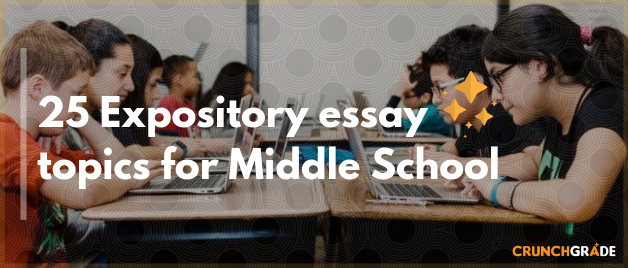
Expository Essays explain a particular topic in a detailed, logical and straightforward manner. These types of essays are completely informative. They do not include any references or any opinion of the writer. The tone of an expository essay is kept neutral. Hence, while writing an expository essay you will be expected to illustrate, define, explain or clarify the topic in a way that the readers can easily understand it completely. You may provide arguments, conduct an investigation or evaluate things in order to provide a clear explanation to your readers.
Essay writing is an art. It is an essential skill to have which is why you’re going to require essay topics for Grade 7 , 8, 9, and 10. You may have to do a lot of creative writing in middle school . Writing is a must-have school and these activities in school prepare you for it.
Types of Expository Essays
- Descriptive Essay – describes a place, thing or an experience
- Problem-Solution Essay – presents a problem and its solution
- Cause-Effect Essay – finds the cause of something and its impact
- Comparison Essay – compares and contrasts two things
- Process Essay – explains a process
How to Choose a Topic for your Expository Essay?
The most difficult and important aspect of essay writing is choosing the ‘right topic’. Many times students choose a difficult topic for which they need to conduct a lot of research which however makes essay writing difficult. Here are 4 quick tips on picking up the right topic –
- Understand the purpose of writing the essay
- Brainstorm some ideas and hence make an informed choice
- Always conduct background research on the topic that you choose to understand its scope
- Start with an outline first! Do not start writing straight away.
Expository Essay Samples
To help you get a better idea of what an expository essay is, consider the samples given below –
Topic: How Students can spend Their Leisure Time
Students have got a lot to handle! From attending classes to completing assignments, and participating in extracurricular activities, the small amount of leisure time that remains for them should be utilized in the best way possible. Students must choose their activities wisely as the way they spend their leisure time can reflect upon their physical and mental well-being.
Sports and Exercises
With most activities being sedentary nowadays, students should find some time to indulge in any kind of sports activity or a workout routine of their choice. Studies have shown that continuous sitting can lead to adverse effects on the health of students. Hence exercise and sports are good choices for students.
Developing Hobbies
Gardening, reading, writing, drawing, painting, or even cooking, there are numerous hobbies to choose from. Students should find some time for pursuing their hobbies, exploring new ones and enhancing their skills as a part of their leisure activity. No one knows when your hobby becomes your passion and hence gives a pathway to your success!
Time to Relax!
It is essential for us to learn to quiet our minds in this busy world. Hence students should develop a habit to relax and practice mindfulness every day. They can pick up any activity for this like meditation, yoga, listening to music, or even sitting with their family and friends. It is crucial for students to stay calm and find time, particularly for them for their mental and spiritual well-being.
These activities can help students take control of their lives. Picking up an activity that does not involve intellect, that is unlike school activities, can help students find a balance in their life. They can relax, play, grow and discover their true potential only through proper utilization of their leisure time.
Expository Essay Topics
Got a gist of how to write an expository essay? Let us have a look at some easy yet interesting expository essays that you can use –
Descriptive Essay
1. Describe your School 2. Describe your Pet 3. How Diversity can affect a Classroom? 4. Why do we Celebrate Christmas? 5. When you saw Snow for the first time
Problem-Solution Essay
1. Many students do not watch the news. How can this be a matter of concern for them? Are there any solutions to this issue? 2. Animal Abuse and Its Solutions 3. Global Warming and Its Solutions 4. What is Deforestation? Why is it a serious issue? How can this issue be solved? 5. How can we make our Community a Better Place?
Cause-Effect Essay
1. How air Pollution is affecting our Health? 2. Bullying in Schools – Causes and Effects 3. Peer Pressure and its Effects 4. Effects of Using Social Media 5. How Poverty affects urban and rural areas
Comparison Essay
1. Compare your two favourite sportspersons 2. Compare your current house to your dream home 3. Compare your two favourite TV shows 4. Watches – then and now! 5. Compare a place you visited recently with your city
Process Essay
1. How to Make Friends 2. How to Study 3. How to Take Care of your Dog 4. How to Fix a Table Fan 5. How to Write a Diary Entry
Got some inspiration to start with your own essay? So why delay? Start wiring your essay today itself. We hope that these topics would have given you a fair idea of what topic you can choose for your expository essay. Happy Writing!
If you need help in writing essays or in the preparation for NAPLAN , you can find online English tutors and online Math tutors on CrunchGrade .
Don’t be shy! you don’t have to make a decision right away. The first 30 Minutes are absolutely FREE!
Book a Session Now!
- homeworkhelp
- Student life
Book a Free Demo
Math Calculus Geometry Algebra Trigonometry Statistics Chemistry Economics Macroeconomics English Physics Computer Science Accounting Biology Business Studies Finance Programming Management Science Year 3 Year 4 Year 5 Year 6 Year 7 Year 8 Year 9 Year 10 Year 11 Year 12 College
Search Here
Recent posts.
- General Achievement Test Australia
- ESL vs English Tutoring – What Makes Them Different?
- Know the Grading System in Australia
- GED vs HiSET: All You Need To Know
- HSPT vs PSAT: Which One Is Beneficial For You?
- WordPress.org
- Documentation
- Support Forums

25 Informative Essay Writing Prompts for the Secondary ELA Classroom
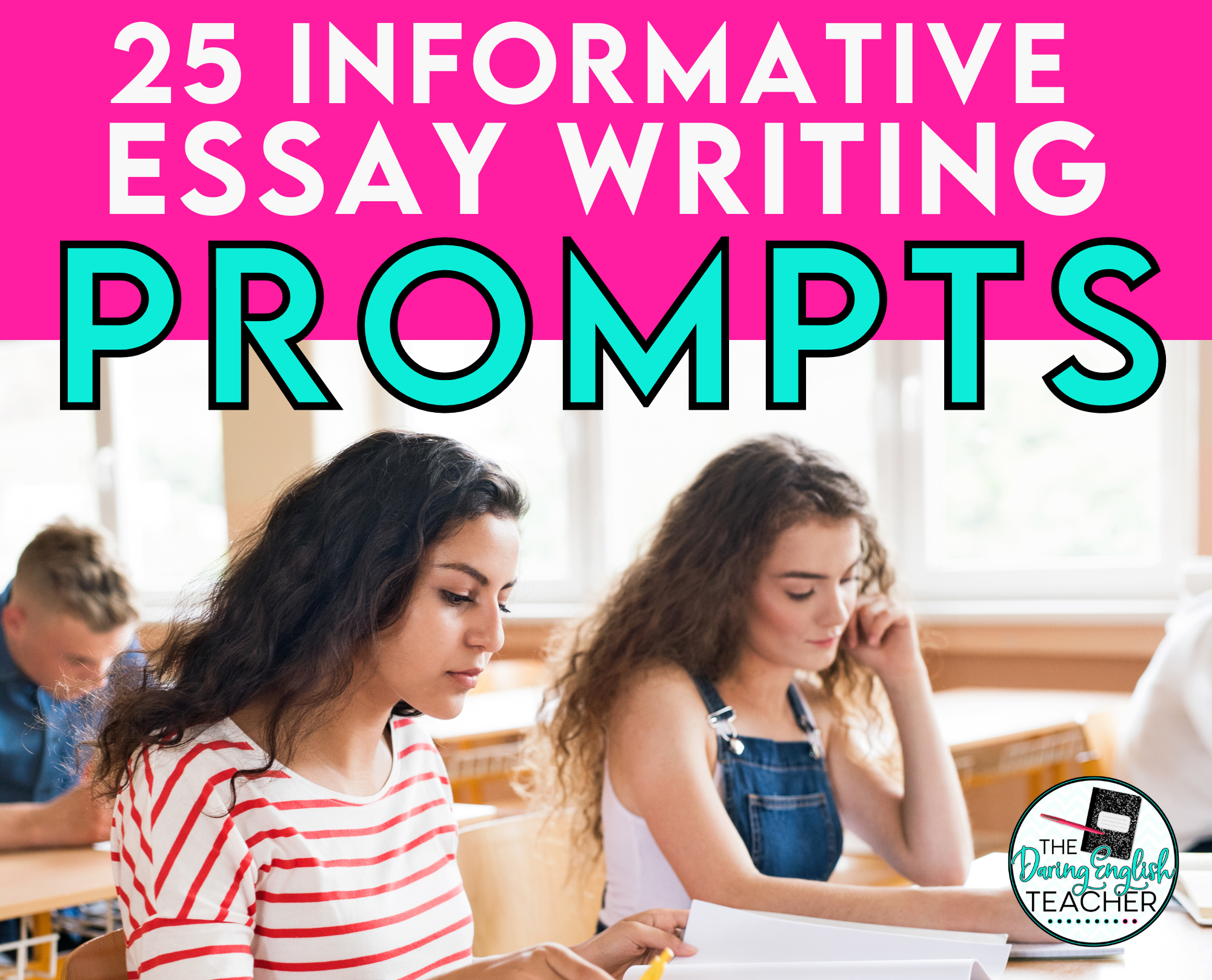
Looking for informative essay writing prompts? I’ve got you covered!
An informative essay is a staple in middle school ELA and high school English classrooms. An informative essay is a type of writing meant to inform the reader about a specific topic. Informative essays are based on facts and evidence and are not meant to persuade or argue a particular point of view.
When I teach informative essay writing to my students, I specify that essays should all be in one tense and written entirely in the third person. To help my students keep their writing in the third person, I like to use this Writing Spotlight: Writing in the Third Person mini-unit alongside my Informational Essay Writing Unit .
I’ve got you covered if you are looking for informational, informative, or explanatory writing prompts to use in your classroom!
Here are 25 informative essay writing prompts to get you started.
- Write an informational essay about the history and significance of a major world event (e.g. the fall of the Berlin Wall, the first moon landing)
- Write an informational essay about the life and accomplishments of a significant historical figure (e.g. Albert Einstein, Mahatma Gandhi)
- Write an informational essay about the causes and effects of a major environmental issue (e.g. climate change, deforestation)
- Write an informational essay about self-driving cars,
- Write an informational essay about an endangered animal and its habitat.
- Write an informational essay about the development and impact of a major scientific or technological breakthrough (e.g. the invention of the internet, the discovery of antibiotics)
- Write an informational essay about the role and importance of a specific branch of government (e.g. the judicial branch, the executive branch)
- Write an informational essay about the effects of a natural disaster (e.g. an earthquake, a hurricane) on a specific community or region
- Write an informational essay about the history and significance of a major cultural movement (e.g. the Harlem Renaissance, the feminist movement)
- Write an informational essay about the impact of social media on communication and relationships
- Write an informational essay about the causes and effects of poverty in a specific region or country
- Write an informational essay about what makes someone a hero.
- Write an informational essay about the impact of globalization on the economy and culture of a specific country or region
- Write an informational essay about the causes and effects of obesity in the United States
- Write an informational essay about the effects of advertising on consumer behavior
- Write an informational essay about the effects of air pollution on human health and the environment
- Write an informational essay about the role and impact of the media in shaping public opinion
- Write an informational essay about three causes of social media addiction
- Write an informational essay about the causes and consequences of cyberbullying
- Write an informational essay about the impact of video games on mental health and social development
- Write an informational essay about how sugar affects the brain
- Write an informational essay about the history and significance of a major world landmark (e.g. the Great Wall of China, the Eiffel Tower)
- Write an informational essay about the role and impact of the arts in society
- Write an informational essay about the effects of music on the brain and behavior
- Write an informational essay about the impact of technology on the education system and learning.
I hope that you find these informative essay writing prompts helpful!
If you are looking for more writing prompts, be sure to check out these additional blog posts:
- 50 Argument Essay Prompts
- Growth Mindset Writing Prompts
- Back-to-School Writing Prompts
Informative Essay Teaching Unit
Engage your students in this informational and expository essay unit that will help them learn how to write academically! This explanatory, expository, and informational writing unit includes everything you need to teach informational and explanatory writing to your middle and high school students. Plus, all of the digital and print materials are included!
What teachers are saying:
⭐️⭐️⭐️⭐️⭐️ Extremely satisfied
“ This is a fantastic resource. The graphic organizers have been amazing for supporting my students as they write essays. The guide says it is for grades 7th through 10th, but I am working with my 6th graders on informative writing and I think these are great resources and tools for them too. Thank you!”
“ Amazing product. This has everything you need to strengthen your student’s writing skills. The Daring English Teacher’s Blog is what I recommend for all my new teacher friends so they can see what a quality lesson includes. The handouts are easy to follow, and slide decks are thoughtfully laid out.”
Leave a Reply Cancel reply
Your email address will not be published. Required fields are marked *
Save my name, email, and website in this browser for the next time I comment.

SUBSCRIBE NOW

- About Michelle Waters
- Curriculum Vitae
- Tools I Use
- Podcast Episodes
- How To Be Our Podcast Guest
- Member Login
- Member Helpdesk
- Support Portal
- Resource Partners
- Writing Partners
- Certificate Verification
- How To Contribute
by Michelle Boyd Waters, M.Ed.
28 Expository Writing Prompts for Middle School
October 12, 2014 in Pedagogy

The ability to provide information in different contexts is essential to effective communication. Students must practice expository writing throughout their academic careers. The sooner they start, the better. Below are some descriptive, sequential, compare and contrast, cause and effect, and problem/solution writing prompts to help you give your students the practice they need.
Descriptive
- Write an essay describing your school to a potentially new student.
- Write an essay describing the appeal of reality TV shows.
- Write an essay describing a rainy night.
- Write an essay describing your first pet.
- Write an essay describing your first memory.
- It’s Christmas morning and there is a package under the tree containing exactly what you requested. Describe the contents of your package..
- Write an essay describing how you feel when you wake up and discover snow on the ground outside — and school has been cancelled.
- Writing an essay explaining the process you use to style your hair in the morning.
- You have invited your two best friends to spend the afternoon at your home. Write an essay telling how your prepare for their visit.
- Everyone has lost something at one time or another. Write an essay telling what you did to find what you had lost.
- Describe how to make a peanut butter and jelly sandwich.
- Tell how you wash your hair.
- Describe the plot of your favorite book.
Compare and Contrast
- Write an essay comparing and contrasting ownership of cats and dogs.
- Compare and contrast this year in school to last year.
- Compare and contrast your two favorite characters.
- Compare and contrast your family’s home and the home of your dreams.
- Compare and contrast a typical day in your life today and what you think a typical day in your life will be like when you are 25.
- Compare and contrast your two favorite teachers.

Cause and Effect
- Write an essay telling how peer pressure has affected you this year.
- Write an essay explaining what causes students to drop out of high school.
- Discuss the causes and effects of bullying in schools.
- Discuss the causes and effects of poverty in rural (urban) areas.
- Discuss the causes and effects of drug or alcohol use on families.
Problem/Solution
- Most students do not read or watch news, resulting in a lack of knowledge about the world outside of their immediate neighborhood. Write an essay describing why this is a problem and telling how this problem might be solved.
- Think about the community in which you live. What could you do to make it a better place? Choose one problem that needs to be solved to make your community a better place to live. Write a letter to the editor describing how solving this problem would make your community a better place, and tell what you would do. Give reasons why you think your plan would work.
- Think about what you could do to make your school more beautiful. Think about how you would do this. How could you persuade the people in your school that your idea is a good one? Write a letter to the principal of your school asking for support for your plan for making your school more beautiful. Tell what you would do and how you would do it. Explain why you think your plan is important and why it would work.
- Think about animal abuse. Some people abuse animals by being intentionally cruel to them or neglecting their basic needs; others abuse animals out of ignorance. Think about what could be done to prevent both kinds of animal abuse. Write a letter to leaders in your community describing how you would solve this problem, and how treating animals better would improve the lives of animals and people. Explain why you think your plan will work.
Related topics: Informative Writing , Quickwriting
About the author
Michelle Boyd Waters, M.Ed.
I am a secondary English Language Arts teacher, a University of Oklahoma student working on my doctorate in Instructional Leadership and Academic Curriculum with an concentration in English Education and co-Editor of the Oklahoma English Journal. I am constantly seeking ways to amplify students' voices and choices.
- Pingback: Writing in the Middle School-Thoughts and Ideas | Teachers Pondering
the prompt should be harder,and including a think about and quote.
Thank you very much for your input, Amelia!
this info is very helpful and all but right now at school (i am in middle school) i have to write an expisitory essay on any topic i am really having trouble finding a topic but it has to be something u can argue like for example: football: people think it is a dangerous sport but the rules have changed more saftey… yeah stuff like that something u can argue ur opinion and so far i have nothing i was really hoping this would help but no but thx anyways i am gonna go to another website but in the future this could really help thx!!!!
But it makes your teacher happy to know what your input is for example what your input is about bullying and drugs.
Thank you so much for this. I need to give my 8th-grader, reluctant writer, some options for what he writes as practice on spring break. This is a great list. I added one about describing the appeal of the YouTube videos he watches, and another about the cause-and-effect of DOnald Trump’s candidacy, since my son is very interested in Trump.
Thank you this helped a lot when I didn’t know what to write for my essay.
I really like this website because i like writing essays for practice and these are a little difficult but It is good for it to be a little diffcult because it is more challenging.
These are great! I will be using these suggestions with my 6th graders! I love expository writing!!!! 🙂
Comments are closed.

- Mathematics
- Reading and Writing
- Intervention
- Professional Learning
- Virtual Events
- What is Phonics?
- Teaching Grammar
- Vocabulary Games
- What is Virtual Learning?
- About Sadlier
- Find a Sales Representative
- International Distributors
- International Programs
- Online Catalogs
- Sadlier School Site Map
- Pricing & Ordering Information
- Sadlier’s W-9
- Sadlier’s Sole Source Letter
- Sadlier’s Credit Application
- Privacy Policy
- Return Policy
- Terms & Conditions
Sadlier's English Language Arts Blog

- Author Interviews
- Interactive Read Alouds
- Close Reading
- Vocabulary/Vocab Gal
- Writing with Vocabulary
- Assessments
- Charts/Posters
- Graphic Organizers
- Back to School
- End of School
- Classroom Management
- Grammar & Writing
- Thinking Routines
- About Our Bloggers
April 23, 2021 CG Writing Lessons CCSS 6-8 , CG Writing Lessons CCSS K-5 , CG Writing Lessons 9-12 , CG Writing Lessons K-5 , CG Writing Lessons 6-8 , CG Writing Lessons CCSS 9-12 , ELA K-5 , ELA 6-8 , ELA Focus - Writing , ELA 9-12 , ELA Resources - Charts/Posters , Core Grammar
Informative/explanatory writing in the classroom, grades 3–12, by: tiffany rehbein.
Lets explore the importance of teaching informative/explanatory writing in the classroom. Students need to have the ability to clearly convey concepts and information in their writing. This skill is crucial for communication in future careers and life! Download a FREE Informative/Explanatory Writing Kit now!
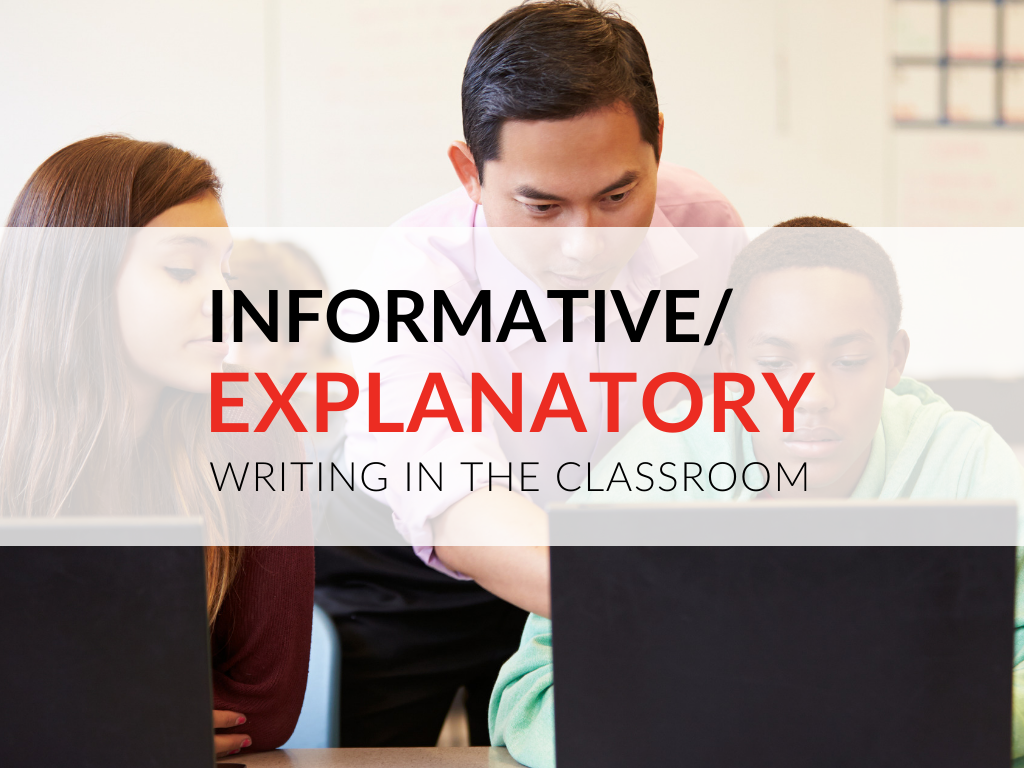
The Purpose of Informative/Explanatory Writing
The primary purpose of informative/explanatory writing is to increase knowledge. When writing an informative/explanatory text, the writer answers questions of why or how. Informative writing educates the reader by imparting straightforward information on a certain topic. Unlike other types of writing, informative writing does not aim to change the reader's thinking or move the reader to take action.
Download a kit of resources that will help students improve their informative/explanatory writing skills.
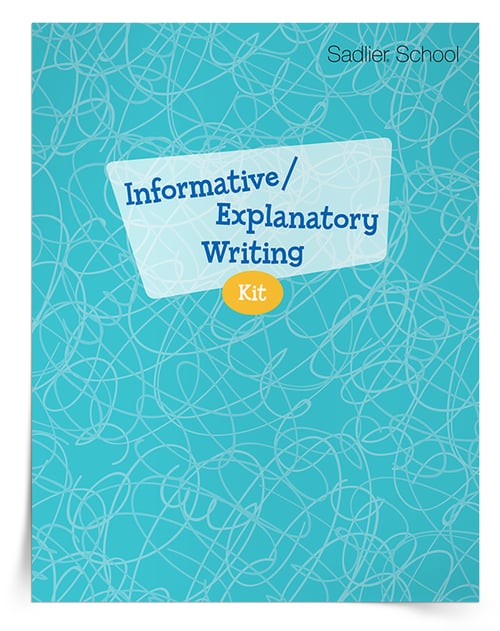
Elements of an Informative/Explanatory Essay
A well-written informative essay should include the following elements:
Has an introduction that introduces a topic and grabs the reader's attention
Clearly conveys information and ideas about a topic
Develops a topic with a variety of specific, relevant details, such as facts, examples, quotations, and anecdotes
Clearly organizes ideas and information, using strategies such as compare/contrast, cause/effect, definition, and classification
Uses formatting, graphics, and multimedia, such as hyperlinks when appropriate
Uses precise language and vocabulary appropriate to the topic
Uses appropriate transition words and phrases that clarify the relationship among ideas
Uses a formal style and tone
Ends with a conclusion that summarizes the main points and follows logically from the information presented
Follows the conventions of standard English
This checklist is a great tip sheet for students to keep in their folders! Teachers can access this checklist in the Informative/Explanatory Writing Kit .
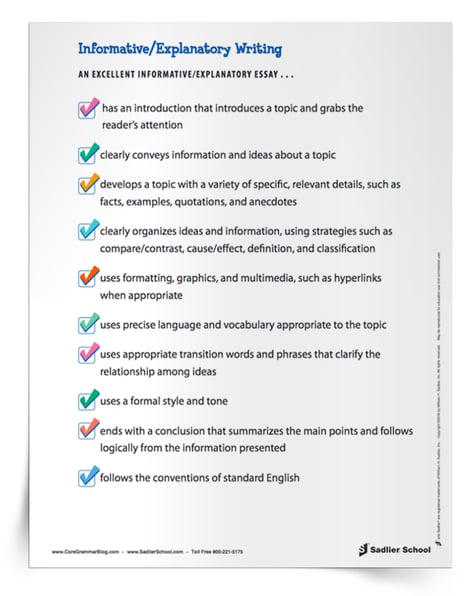
Introductions and Conclusions for Informational Writing
Introductions
In many essays, the first paragraph should introduce your topic to readers and include a thesis statement, or claim. A thesis statement is one or two sentences that state your main idea.
A strong introduction also needs to capture the readers’ attention. Students can use one of the following to get readers interested right away:
- Include an unusual fact
- Ask a question
- Include vivid description
- Tell a brief story
Introduction examples for informative/explanatory texts...
WEAK – Money has been important to people throughout history. This paper will describe the history of money and explain why people started using it. It will also describe different types of money.
STRONG – Think of these four things: knives, beads, cows, and whales' teeth. What do they have in common? The answer is that people have used them as money in trades. Through history, different cultures have used some surprising forms of currency.
Conclusions
A good conclusion sums up your main point and restates the these statement in a new way.
Students should use their conclusion to bring your writing to a satisfying finish. Students can use the following strategies to wrap up an essay:
- Summarize key points
- Make a prediction
- Offer an opinion or a suggestion
- Explain the topic's importance
Download a tip sheet for students that outlines strategies for writing introductions and conclusions for informative/explanatory texts!
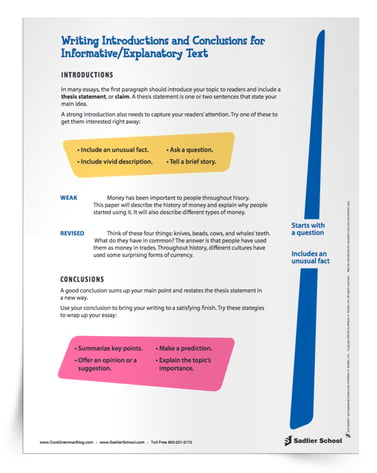
Transition Words and Phrases for Information Writing
A well-written informational essay uses techniques to build coherence between and within paragraphs. Coherence in writing means that a reader can move easily and clearly from one idea to the next. To achieve coherence, writers use transitions words and phrases. Linking ideas and key information with transition words and phrases will tie one sentence to another and show the connections between ideas.
Below is a tip sheet that lists transition words and phrases that can be used to build coherence between and within paragraphs. Download my Informative/Explanatory Writing Kit to make get the worksheet for your students!
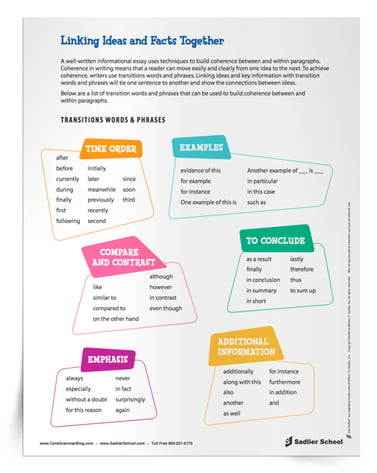
Informative/Explanatory Writing Assignments
There are a number of ways for students to practice writing informative/explanatory texts. Some of my favorite informative writing assignments are:
- Basic Paragraph
- Brochure/Pamphlet
Writing Assignment Idea #1
My Informative/Explanatory Writing Kit includes an informational writing activity worksheet for students! With this informative writing assignment students will write about something they like to make or do. It could be their favorite recipe or craft, a game they like to play or hobby. Using the worksheet, students will write the directions of how to follow the rules, recipe, or steps to create something. In addition to writing about something they like to make/play, students will underline all linking words and draw an illustration!
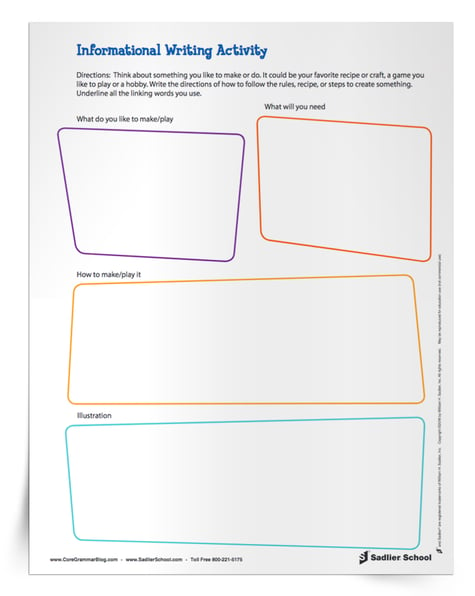
Below are two additional writing assignments you could assign students to work on their informative writing skills. In addition to looking at the ways your students write informative or explanatory texts, you will also have the chance to check that proper nouns are capitalized properly. What a great way to combine writing and grammar!
Writing Assignment Idea #2
To assess how well your students write informative/explanatory texts, use calendar holidays as a writing topic. For instance, you might ask students to choose their favorite holiday and explain in writing why they like it the best.
To help students choose a holiday for an explanatory essay, you could provide them with a list. Some common holidays follow:
- Thanksgiving
- New Year’s Eve
- Valentine's Day
- St. Patrick's Day
- Fourth of July
Writing Assignment Idea #3
Want to be more creative? You can add a twist to the informative essay and provide your students with some lesser-known days of celebration. This would encourage students to do some research and inform their audience. Here are some possible calendar celebrations students could research and write about:
- Metropolitan Museum of Art Opened in NYC (1872)
- Jackie Robinson Day
- World Fish Migration Day
- National Plush Animal Day
- King Tut Day
- William Shakespeare's Birthday
- Transportation Week
- World Architecture Day
Informative/Explanatory Writing Format
Informative or explanatory writing follows an organized format. Using the anagram INFORM, teachers and students can easily remember the elements of an informative essay . Download a poster to remind your students about the parts of the INFORMative essay!
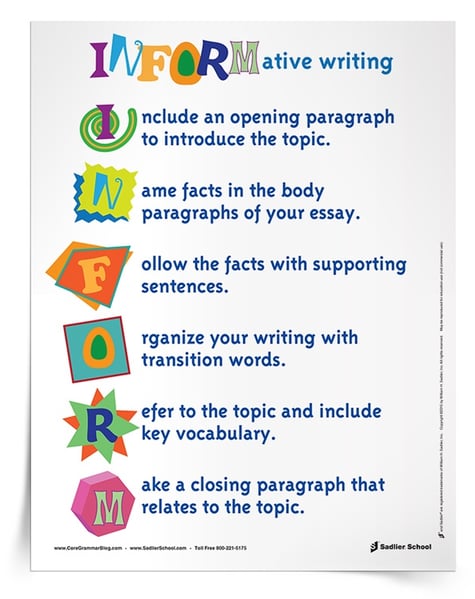
How to Write an Informative Essay: Everything You Need to Know

Did you know that informative essays aren't just for school? They're also used in jobs like journalism, marketing, and PR to explain complex ideas and promote things. This shows how useful they are outside of the classroom.
So, if you're planning to write one, that's a great choice! It's interesting but can be tough. To do it well, you need to plan, research, and organize carefully. Keep your tone balanced, give clear info, and add your own thoughts to stand out.
In this guide, our essay writer will give you tips on starting and organizing your essay effectively. At the end, you'll also find interesting essay samples. So, let's jump right into it.
What is an Informative Essay
To give a good informative essay definition, imagine them as windows to new knowledge. Their main job is to teach others about a particular topic. Whether it's for a school project or something you stumble upon online, these essays are packed with interesting facts and insights.
Here's a simple breakdown from our admission essay writing service of what makes an informative essay tick:

- Keeping It Real: These essays are all about the facts. No opinions allowed. We want to keep things fair and honest.
- Topics Galore: You can write about anything you find interesting, from science and history to things about different cultures.
- Where You Find Them: Informative essays can pop up anywhere, from your classroom assignments to the pages of magazines or even online articles.
- Research: Like a good detective, informative essays rely on solid evidence. That means digging into trustworthy sources to gather reliable information.
- Stay Neutral: To keep things fair, informative essays don't take sides. They present the facts and let readers draw their own conclusions.
- Structure: These essays have a clear roadmap. They start with an introduction to set the stage, then present the main points with evidence, and wrap up with a summary to tie it all together.
- Write for Your Audience: Keep your writing simple and easy to understand. Think about who will be reading it.
- Give Just Enough Detail: Don't overload people with info. Find the right balance so it's interesting but not overwhelming.
Ready to Ignite Minds with Your Informative Essay?
Our qualified writers are here to craft a masterpiece tailored to your needs worthy of an A+
Reasons to Write an Informative Essay
Writing informative essays, whether following the IEEE format or another style, is a great way to teach and share ideas with others. Here's why it's worth giving it a try:
.webp)
- Make Complex Ideas Easy : Informative essays simplify complicated topics so everyone can understand them. They break down big ideas into simple parts, helping more people learn and share knowledge.
- Encourage Thinking : When you read these essays, you're encouraged to think for yourself. They give you facts and evidence so you can form your own opinions about different topics. This helps you become better at understanding the world around you.
- Inspire Doing : They can motivate people to take action and make positive changes by raising awareness about important issues like the environment, fairness, or health. By reading these essays, people might be inspired to do something to help.
- Leave a Mark : When you write informative essays, you're leaving a legacy of knowledge for future generations. Your ideas can be read and learned from long after you're gone, helping others understand the world better.
How to Start an Informative Essay
If you're still doubting how to start with an informative essay outline, no worries! Here's a step-by-step guide to help you tackle this task like a pro. Alternatively, you can simply order essay and have it done by experts.

- Choose an Exciting Topic : Pick something that really grabs your attention. Writing about what you're genuinely interested in makes the whole process way more fun. Plus, it's easier to write confidently about things you know a bit about.
- Dig into Research : Spend some quality time digging up info from reliable sources. Take good notes, so you have all the facts you need to back up your essay. The better your research, the stronger your essay will be.
- Set Your Essay's Goal : Decide what you want your essay to do. Are you explaining something, analyzing a problem, or comparing ideas? Knowing your goal helps you focus your writing.
- Sketch Out Your Essay : Make a simple plan for your essay. Start with an intro that grabs attention and states your main idea. Then, map out your main points for the body paragraphs and plan a strong finish for your conclusion.
- Kick Off with an Awesome Introduction : Start with a killer opening line to hook your readers. Give a bit of background on your topic and clearly state your main idea.
- Flesh Out Your Body Paragraphs : In each paragraph, cover one key point backed up with evidence from your research. Keep it clear and simple, and don't forget to cite your sources.
- Wrap Up Strong : Sum up your main points in your conclusion and restate your main idea in a memorable way. Leave your readers with something to think about related to your topic.
Informative Essay Outline
Many students don't realize how helpful outlining can be for writing an informative essay. Spending a bit of time on it can actually save you loads of time later on when you're writing. To give you a head start, here's a simple format from our term paper writing services :
I. Introduction
- Start with something catchy to grab attention
- Give a little background info on your topic
- State your main idea clearly in your thesis statement
II. Body Paragraphs
A. Talk about your first main idea
- Share evidence or facts that support this idea
- Explain what the evidence means
- Transition smoothly to the next point
B. Move on to your second main idea
- Provide evidence or facts for this point
- Explain why this evidence matters
- Transition to the next paragraph
C. Address your third main idea
- Offer supporting evidence or facts
- Explain the significance of this evidence
- Transition to the next part
III. Conclusion
- Restate your thesis statement to remind readers of your main point
- Summarize the key points you've covered in the body paragraphs
- Leave readers with some final thoughts or reflections to ponder
IV. Optional: Extra Sections
- Consider addressing counterarguments and explaining why they're not valid (if needed)
- Offer suggestions for further research or additional reading
- Share personal anecdotes or examples to make your essay more relatable (if it fits)
Informative Essay Structure
Now that you've got a plan and know how to start an essay let's talk about how to organize it in more detail.
Introduction :
In your informative essay introduction, your aim is to grab the reader's interest and provide a bit of background on your topic. Start with something attention-grabbing, like a surprising fact or a thought-provoking question. Then, give a quick overview of what you'll be talking about in your essay with a clear thesis statement that tells the reader what your main points will be.
Body Paragraphs:
The body paragraphs of an informative essay should dive into the main ideas of your topic. Aim for at least three main points and back them up with evidence from reliable sources. Remember the 'C-E-E' formula: Claim, Evidence, Explanation. Start each paragraph with a clear point, then provide evidence to support it, and finally, explain why it's important. Mastering how to write an informative essay also requires smooth transitions from one section to the next, so don't forget to use transition words.
Conclusion :
You may already guess how to write a conclusion for an informative essay, as it's quite similar to other writing types. Wrap up by summarizing the main points you've made. Restate your thesis to remind the reader what your essay was all about. Then, leave them with some final thoughts or reflections to think about. Maybe suggest why your topic is important or what people can learn from it.

Informative Essay Examples
Essay examples show how theoretical ideas can be applied effectively and engagingly. So, let's check them out for good structure, organization, and presentation techniques.
Additionally, you can also explore essay writing apps that offer convenience and flexibility, allowing you to work on assignments wherever you are.
7 Steps for Writing an Informative Essay
Before you leave, here are 7 simple yet crucial steps for writing an informative essay. Make sure to incorporate them into your writing process:
.webp)
- Choose Your Topic: If you're given the freedom to choose your topic, opt for something you're passionate about and can explain effectively in about five paragraphs. Begin with a broad subject area and gradually narrow it down to a specific topic. Consider conducting preliminary research to ensure there's enough information available to support your essay.
- Do Your Research: Dive deep into your chosen topic and gather information from reliable sources. Ensure that the sources you use are credible and can be referenced in your essay. This step is crucial for building a solid foundation of knowledge on your topic.
- Create an Outline: Once you've collected your research, organize your thoughts by creating an outline. Think of it as a roadmap for your essay, briefly summarizing what each paragraph will cover. This step helps maintain coherence and ensures that you cover all essential points in your essay.
- Start Writing: With your outline in hand, begin drafting your essay. Don't strive for perfection on the first attempt; instead, focus on getting your ideas down on paper. Maintain an objective and informative tone, avoiding overly complex language or unnecessary embellishments.
- Revise Your Draft: After completing the initial draft, take a break before revisiting your work. Read through your essay carefully, assessing how well your arguments are supported by evidence and ensuring a smooth flow of ideas. Rewrite any sections that require improvement to strengthen your essay's overall coherence and clarity.
- Proofread: Once you've revised your essay, thoroughly proofread it to catch any spelling or grammar errors. Additionally, verify the accuracy of the facts and information presented in your essay. A polished and error-free essay reflects positively on your attention to detail and credibility as a writer.
- Cite Your Sources: Finally, include a citations page to acknowledge the sources you've referenced in your essay. Follow the formatting guidelines of the chosen citation style, whether it's MLA, APA, or Chicago, to ensure consistency and proper credit to the original authors. This step is essential for maintaining academic integrity and avoiding plagiarism accusations.
Final Remarks
Fantastic! Now that you know how to write an informative essay and absorbed the essentials, let's recap the key points:
- You've learned the basics of informative essay writing.
- Ready to choose an interesting topic that connects with your audience.
- You've understood how to organize your essay clearly, with each paragraph serving a purpose.
- You have step-by-step guidance for writing engagingly.
- You've gained valuable tips to improve your writing skills and make your essay stand out.
By applying these insights, you're set to write an engaging essay that informs and inspires your readers!
Want to Unleash the Brilliance of Your Ideas?
Claim your expertly crafted informative essay today and command attention with your brilliant insights!
Related Articles
.webp)
Home — Essay Types — Informative Essay
Informative Essay Examples
Selecting an informative essay topic is a critical step in the writing process, shaping the direction and scope of your essay. The topic you choose should not only capture your interest but also offer ample opportunities for research and exploration. In this guide, we'll explore strategies for choosing the right topic and provide a diverse range of examples across various categories to inspire your writing journey.
When selecting an informative essay topic, consider your interests, expertise, and the preferences of your audience. Begin by brainstorming ideas based on subjects that intrigue you or align with your academic field. Conduct preliminary research to gauge the availability of credible sources and the depth of information on each topic. Additionally, assess the relevance and significance of potential topics, ensuring they align with the objectives of your essay and offer value to your readers.
Examples of Good Informative Essay Topics
Health and wellness.
- The Benefits of Meditation for Mental Health
- Understanding the Importance of Vaccinations
- Exploring Alternative Medicine Practices
Science and Technology
- The Impact of Artificial Intelligence on Society
- Emerging Technologies in Renewable Energy
- The Future of Space Exploration
Education and Learning
- Innovations in Online Learning Platforms
- Strategies for Effective Study Habits
- The Evolution of Literacy in the Digital Age
History and Culture
- The Legacy of Ancient Civilizations: Egypt, Greece, Rome
- Women's Rights Movements Throughout History
- Cultural Traditions and Festivals Around the World
Environment and Sustainability
- Addressing Climate Change: Causes and Solutions
- The Importance of Biodiversity Conservation
- Sustainable Practices for Reducing Plastic Pollution
Social Issues and Politics
- The Effects of Social Media on Mental Health
- Analyzing Global Refugee Crises and Solutions
- Racial Inequality in Criminal Justice Systems
Economics and Finance
- Understanding Cryptocurrency: Benefits and Risks
- The Impact of Globalization on Local Economies
- Financial Literacy: Budgeting and Saving Strategies
Arts and Entertainment
- Exploring the Evolution of Film Genres
- The Influence of Music on Mood and Emotions
- Cultural Significance of Literature and Folklore
Travel and Tourism
- Sustainable Tourism Practices: Balancing Conservation and Recreation
- Hidden Gems: Off-the-Beaten-Path Destinations
- Cultural Immersion Through Food and Cuisine
Sports and Recreation
- The Psychology of Sports: Mental Toughness and Resilience
- Exploring Extreme Sports and Adventure Activities
- Sportsmanship and Ethics in Competitive Athletics
Some Informative Essay Ideas for Inspiration
- The Influence of Social Media on Teenagers
- Benefits of Renewable Energy Sources
- Importance of Financial Literacy Education
- Causes and Effects of Climate Change
- Types and Treatments of Anxiety Disorders
- Evolution of Artificial Intelligence
- Diversity and Inclusion in the Workplace
- Effects of Sleep Deprivation on Health
- Cultural Customs and Traditions Around the World
- Education's Role in Economic Development
By considering these examples and employing effective strategies for topic selection, you can embark on your informative essay writing journey with confidence and enthusiasm. Remember to choose a topic that aligns with your interests, offers valuable insights to your audience, and inspires further exploration and learning.
Mastering the art of informative essay writing is invaluable for students across all academic disciplines. Whether you’re tasked with dissecting complex topics or elucidating fundamental concepts, honing your skills in this form of composition can significantly enhance your academic prowess. In this guide, we’ll delve into key strategies and techniques to help you craft compelling and informative essays that captivate your readers’ attention and convey your message effectively.
Understanding the Informative Essay
Before embarking on your writing journey, it’s crucial to grasp the essence of informative essays. Unlike persuasive or argumentative essays, which aim to sway the reader’s opinion, informative essays primarily seek to educate and inform. These essays present factual information in a clear, concise, and engaging manner, devoid of personal bias or subjective viewpoints. By adhering to this objective stance, you can maintain credibility and authority in your writing.
Selecting a Compelling Topic
The foundation of a successful informative essay lies in the choice of an intriguing and relevant topic. Whether you’re exploring historical events, scientific phenomena, or societal issues, opt for subjects that pique your interest and offer ample scope for exploration. Conduct thorough research to ensure the availability of credible sources and sufficient information to support your discussion. Additionally, consider your target audience and their level of familiarity with the topic to tailor your essay effectively.
Structuring Your Informative Essay
A well-organized structure is essential for conveying information effectively in your essay. Begin with an introduction that provides context and previews the main points you’ll cover. Follow this with a series of body paragraphs, each focusing on a distinct aspect or subtopic related to your chosen subject. Use topic sentences to introduce each paragraph’s main idea and support it with evidence, examples, and relevant data. Finally, conclude your essay by summarizing key points and reinforcing the significance of your topic.
To craft an effective introduction for an informative essay, focus on engaging your readers while providing essential context.
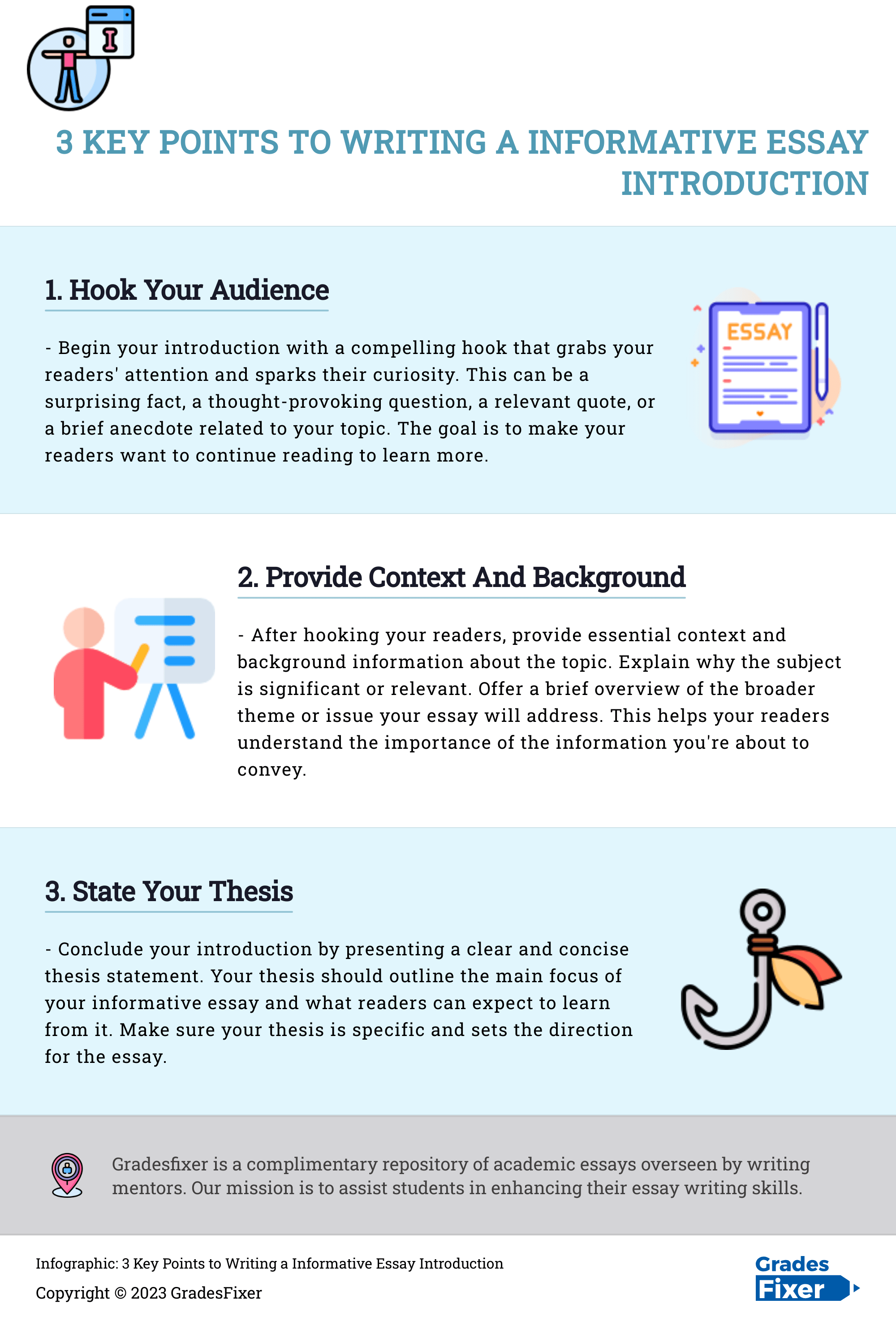
Here’s an example of an informative essay introduction following these guidelines:
“Have you ever wondered how social media platforms collect and use your personal data? In an age where online privacy concerns continue to grow, understanding the intricacies of data collection is crucial. In this informative essay, we will delve into the world of data mining by social media giants, exploring how your information is gathered and utilized to personalize your online experience. As we uncover the methods and implications of this practice, you’ll gain valuable insights into the digital landscape and learn how to protect your online privacy effectively.”
This introduction combines a captivating hook, context about the topic’s significance, and a clear thesis statement to engage the reader and set the stage for the informative essay.
Before you continue with our free example of informative essay, make sure that you check our informative writing checklist , which will help you structure and keep your writing readable and logical:
✔️ Your tone should be informative as the purpose of this essay type is to inform. ( Explain your subject by starting with a brief introduction or the fact that will inspire your readers.)
✔️ You have studies the topic and gathered some evidence to support the facts. ( It can be statistica data, peer-reviewed journals, or quotes from the books in print. Use only verified resources.)
✔️ Focus on your audience and explain complex terms if necessary.
✔️ No argumentation or bias is allowed.
✔️ Only the paragraph before.
✔️ The conclusion can contain analysis that speaks of your opinion.
As always, keep things structured and show due respect and care when informing your readers about sensitive or controversial issues.
How to Start an Informative Essay
Starting an informative essay with a compelling introduction is essential to engage your readers and set the stage for the discussion ahead. Follow these steps to craft an impactful beginning:
1. Grab Attention with a Hook: Begin your essay with an attention-grabbing hook that intrigues your readers and draws them into your topic. This could be an interesting fact, a startling statistic, a thought-provoking question, or a compelling anecdote related to your subject matter.
Example: “Did you know that the average person spends over two hours a day on social media platforms?”
2. Provide Context: After hooking your readers, provide some background information to contextualize your topic. Briefly explain the significance of the subject matter and why it’s worth exploring further. This helps orient your audience and prepares them for the information you’re about to present.
Example: “In today’s digital age, social media has become an integral part of our daily lives, shaping how we communicate, consume information, and interact with the world around us.”
3. Present a Thesis Statement: Conclude your introduction with a clear and concise thesis statement that outlines the main purpose and focus of your essay. Your thesis should articulate the specific topic you’ll be discussing and the key points you’ll be exploring in the subsequent sections of your essay.
Example: “This essay will delve into the impact of social media on interpersonal relationships, exploring its influence on communication patterns, social interactions, and personal connections.”
By following these steps, you can craft a captivating introduction that entices readers to continue reading and sets the tone for your informative essay.
Informative Essay Examples for College Students
College students often encounter the task of writing informative essays as part of their coursework. Here are a few examples of topics suitable for college-level informative essays:
- The Rise of Renewable Energy Sources: Explore the advancements in renewable energy technologies such as solar, wind, and hydroelectric power, highlighting their environmental benefits and potential to mitigate climate change.
- The Impact of Artificial Intelligence on Society: Investigate the growing influence of AI in various sectors, including healthcare, finance, and transportation, discussing its implications for employment, privacy, and ethics.
- Understanding Mental Health Disorders: Provide an overview of common mental health disorders such as anxiety, depression, and bipolar disorder, discussing their symptoms, causes, and available treatment options.
- The Evolution of Social Media: Trace the evolution of social media platforms from their inception to the present day, examining their role in shaping communication patterns, social interactions, and online communities.
- Exploring Cultural Diversity in Modern Society: Examine the concept of cultural diversity and its importance in today’s globalized world, discussing the benefits of multiculturalism and strategies for promoting inclusivity.
- The Science of Climate Change: Present an in-depth analysis of the scientific evidence behind climate change, explaining key concepts such as greenhouse gas emissions, global warming, and sea-level rise.
- The Impact of Globalization on International Trade: Analyze the effects of globalization on global trade patterns, discussing factors such as trade agreements, outsourcing, and supply chain management.
- The History and Significance of the Civil Rights Movement: Explore the history of the civil rights movement in the United States, highlighting key events, leaders, and achievements in the struggle for racial equality.
These topics provide college students with ample opportunities to research, analyze, and present information on diverse subjects of interest. When writing informative essays, students should focus on providing factual information, supporting their arguments with evidence, and presenting their findings in a clear and organized manner.
Informative Essay Examples for High School Students
High school students often engage in informative essay writing to develop critical thinking skills and enhance their ability to convey information effectively. Here are some examples of informative essay topics suitable for high school students:
- The Importance of Healthy Eating Habits: Discuss the benefits of a balanced diet, including the role of nutrients in maintaining overall health and preventing chronic diseases such as obesity and diabetes.
- The Impact of Social Media on Teenagers: Examine the effects of excessive social media use on teenage mental health, self-esteem, and interpersonal relationships, highlighting both the positive and negative aspects.
- Exploring Career Options in STEM Fields: Provide an overview of career opportunities in science, technology, engineering, and mathematics (STEM), discussing the educational requirements, job prospects, and potential for innovation in these fields.
- Understanding Cyberbullying and Its Consequences: Define cyberbullying and discuss its prevalence among adolescents, exploring the psychological and emotional effects on victims and strategies for prevention and intervention.
- The Benefits of Exercise for Teenagers: Explain the importance of regular physical activity for teenage health and well-being, discussing its effects on physical fitness, mood regulation, and academic performance.
- The History of Civil Rights Movements: Explore significant civil rights movements throughout history, such as the Civil Rights Movement in the United States and the fight for gender equality, discussing key events, leaders, and achievements.
- The Science Behind Climate Change: Present scientific evidence for climate change and its causes, including the role of greenhouse gases, deforestation, and industrialization, and discuss potential solutions to mitigate its impact.
- The Impact of Technology on Education: Analyze the influence of technology on modern education, discussing its role in facilitating learning, expanding access to resources, and promoting innovative teaching methods.
These informative essay topics provide high school students with opportunities to explore relevant issues, develop research skills, and articulate their ideas in a clear and organized manner. When writing informative essays, students should focus on presenting factual information, supporting their arguments with evidence, and engaging their audience with compelling content.
Informative Essay Examples for Middle School Students
Middle school students can benefit from engaging in informative essay writing to develop research skills and enhance their ability to communicate information effectively. Here are some examples of informative essay topics suitable for middle school students:
- The Life Cycle of Butterflies: Provide an overview of the stages of a butterfly’s life cycle, including egg, larva (caterpillar), pupa (chrysalis), and adult, discussing the significance of each stage and the transformation process.
- Exploring Volcanoes and How They Form: Explain the geological processes that lead to the formation of volcanoes, discussing the types of volcanoes, volcanic eruptions, and their impact on the environment and communities.
- The Importance of Recycling: Discuss the benefits of recycling materials such as paper, plastic, glass, and metal, explaining how recycling conserves natural resources, reduces waste, and helps protect the environment.
- The Human Digestive System: Describe the organs and functions of the human digestive system, including the mouth, esophagus, stomach, small intestine, and large intestine, and discuss the process of digestion and nutrient absorption.
- The Solar System and Its Planets: Provide an overview of the solar system, including the sun, planets, moons, asteroids, and comets, discussing the characteristics of each planet and their orbits around the sun.
- The History of Ancient Civilizations: Explore the achievements and contributions of ancient civilizations such as Mesopotamia, Egypt, Greece, and Rome, discussing their culture, government, religion, and technological advancements.
- Endangered Species and Conservation Efforts: Identify endangered species around the world and discuss the factors contributing to their decline, including habitat loss, pollution, and poaching, and explore conservation efforts to protect these species.
- The Water Cycle and Its Importance: Explain the processes involved in the water cycle, including evaporation, condensation, precipitation, and runoff, discussing the significance of the water cycle for sustaining life on Earth.
These informative essay topics provide middle school students with opportunities to explore diverse subjects, develop research skills, and present their findings in a clear and organized manner. When writing informative essays, students should focus on providing factual information, supporting their arguments with evidence, and engaging their audience with interesting and relevant content.
Conclusion: Mastering the Art of Informative Essay Writing
In mastering the craft of informative essay writing, students embark on a journey of discovery, exploration, and communication. Through the meticulous selection of topics, diligent research, and thoughtful structuring of their essays, students can effectively convey factual information and captivate their readers’ attention. By adhering to the principles outlined in this guide, students can hone their writing skills, develop critical thinking abilities, and enhance their academic proficiency.
Remember, the key to crafting compelling informative essays lies in maintaining objectivity, clarity, and coherence throughout the writing process. Whether delving into the complexities of scientific phenomena or unraveling the intricacies of historical events, students have the power to inform, educate, and inspire through their writing.
As you embark on your informative essay writing journey, remember to engage with your topic passionately, remain open to new ideas, and strive for excellence in every aspect of your writing. With dedication, perseverance, and a commitment to continuous improvement, you can become a proficient and persuasive communicator, capable of leaving a lasting impact through your informative essays.
Happy writing, and may your essays enlighten, educate, and empower those who read them.
If you have any further questions or need assistance with your writing endeavors, don’t hesitate to reach out for guidance and support.
Informative Speech: The Lucid Dream Body
Lucid dreaming is a fascinating phenomenon that has captured the interest of researchers and the general public alike. It is a state of consciousness in which a person is aware that they are dreaming and can often control the content of their dream. In recent…
Soccer Informative Speech
Introduction Soccer, also known as football in many countries, is the most popular sport in the world. With over 4 billion fans globally, it is played and watched by people of all ages, genders, and backgrounds. In this informative speech, we will delve into the…
Information On The Holocaust
The Holocaust, also known as the Shoah, was a genocide that occurred during World War II, resulting in the systematic extermination of six million Jews, as well as millions of other victims, including Romani people, Poles, Soviet prisoners of war, disabled individuals, and political dissidents….
Informative Speech Outline on Cancer
Cancer, a term that strikes fear into the hearts of many, is a disease that affects millions of people worldwide. Its impact is not just physical but extends to emotional, social, and economic realms, leaving a profound mark on individuals, families, and communities. In this…
Get professional help in 5 minutes

Smoking Informative Speech
Good afternoon, ladies and gentlemen. Today, I would like to talk to you about the dangers of smoking and the impact it has on individuals and society as a whole. Smoking is a prevalent habit that has been around for centuries, but it is important…
The Salem Witch Trials: a Dark Chapter in American History
The Salem Witch Trials, which occurred in colonial Massachusetts between 1692 and 1693, stand as one of the most notorious and tragic episodes in American history. The events that unfolded during this period continue to captivate the public imagination and serve as a cautionary tale…
The Second Amendment in the United States
The Second Amendment to the United States Constitution is a hotly debated and controversial topic that has been the subject of intense scrutiny and discussion for many years. The Second Amendment, which was adopted on December 15, 1791, as part of the Bill of Rights,…
Informative Speech on Anne Frank
Anne Frank is one of the most well-known figures of the Holocaust and World War II. Her diary, which she kept while in hiding from the Nazis, has become a symbol of hope and resilience in the face of adversity. In this speech, we will…
Alcohol: Informative Speech
Alcohol is a widely consumed substance around the world, with a long history of use in various cultures and societies. While alcohol can be enjoyed responsibly by many individuals, it also has the potential to cause significant harm when consumed in excess. In this informative…
Volleyball: Informative Speech
Volleyball is a popular sport that is played by millions of people around the world. It is a game that requires skill, teamwork, and athleticism. In this informative speech, we will explore the history of volleyball, the rules of the game, and the benefits of…
What is an informative essay?
The key is to provide your audience with information on a certain topic. You must educate by offering a brief description and accessible information. Some informative essay examples include topics that deal with a process, an effect of something that took place, or the list of ideas that are not common knowledge. Remember that you only provide certain data with no opinion or bias towards any side.
How to write an informative essay?
The trick is to make things readable and clear enough if you are not writing for a specific audience. As a rule, you should provide a brief description and talk about the importance of a certain subject. Use facts, statistical data, and reliable references. It must be informative and implement real-life examples to make your essay supported. Once again, do not use a biased tone and avoid posing an opinion.
The types of informative essays
The examples of informative essays will vary depending on a task that you have been given. The types will divide on the definition of a term, comparison or contrasting of particular information, analysis of discovered data, and an explanation of how something must be done. When using argumentation, try to find information that does not lean towards critical thinking. If it is not possible provide both opinions without stating yours.
The most popular topics for Informative Essay
- Drug Addiction
- Christopher Columbus
- Cyber Security
- Teenage Pregnancy
- Homelessness
- Procrastination
- Global Warming
- Child Abuse
- Capital Punishment
- Human Resources
Students also browse
- Proposal Essay
- Analytical Essay
- Problem Solution Essay
- Memoir Essay
- Research Essay
- Autobiography Essays
- Evaluation Essay
- Rhetorical Analysis Essay
- Exemplification Essays
- Compare and Contrast Essay
We use cookies to personalyze your web-site experience. By continuing we’ll assume you board with our cookie policy .
- Instructions Followed To The Letter
- Deadlines Met At Every Stage
- Unique And Plagiarism Free
Master the Art of Writing an Informative Essay with These 10 Examples
Mar 7, 2023

Mar 7, 2023 | Blog
Informative essays provide information to the readers by free essay writers . The essays can be on any topic but should be clear and concise. The facts in informative essays should be presented logically and with appropriate supporting evidence.
In writing informative essays, avoid using technical words and phrases that might confuse your readers. Instead, explain technical terms by providing their meanings and uses. Remember that your readers will not know anything about your topic, so you must provide some background information.
Using the active voice helps maintain a clear subject-verb relationship in your sentences. The active voice generally makes sentences clearer, shorter, and easier to read. You may also consider using short sentences or bullet points in an informative essay. This will help ensure that your main points are easy for your readers to find and follow.
In general, summarize each paragraph after you have finished writing it. Remember to provide background information about your essay topic so readers can understand it.
People also read
- Top 100 Controversial Informative Speech Topics
- Top 100 Fun Informative Speech Topics
- Top 100 Creative Informative Speech Topics
- Top 100 Informative Essay Topics
- Get Inspired: Top 20 Informative Speech Examples and Samples
Structure of an Informative Essay
There are three main parts to any informative essay:
- An introductory paragraph that summarizes the main ideas;
- Body paragraphs- Two or more paragraphs that develop those ideas with examples, details, explanations, and quotations;
- A concluding paragraph restates the main ideas and adds a thought that follows them.
All three essential parts of an essay are important. If you omit any of them, your informative writing will be weaker.
The concluding paragraph is the most important part because it summarizes what you have said. Readers will likely stop reading your essay if you don’t have a good summary. But all three parts are essential to holding together an essay as complex as an informative essay.
1. Introduction
The thesis statement should clarify the main point of the essay. A brief background on the topic can be provided by starting with an interesting fact. This should be followed by an interesting anecdote or quotation related to your chosen topic. The introduction should introduce the essay’s main points, not just summarize what will come later.
2. Body Paragraphs
Each body paragraph should discuss one central point and include three parts:
a. A concise statement about why this point is important;
b. A piece of evidence that supports this point; and
c. Discuss how this evidence proves your point (this can also be called a thesis sentence).
d. A transition sentence that connects the paragraph with the previous paragraph. Please consider the themes and how they relate to the thesis statement.
3. Conclusion
The conclusion should restate your main points, include a relevant quote, and briefly summarize your argument.
For tutoring, check out alchemy on how to craft and structure your informative essay.
How do I Write an Informative Essay?
Informative essays are longer than other essays and often require a good deal of research. They give facts and details, supporting them with evidence and examples. An informative essay provides readers with information about a certain topic. When writing an informative essay, it is important to consider what information you want to include.
So, how do you write an informative essay? Follow these steps for help:
Step 1: Choose a topic
It would help to begin by choosing a topic you know about or have researched thoroughly. You will want to narrow the essay’s focus to provide detailed information. Consider what aspects of the subject will be most interesting or useful for your audience, and focus on these points. Some topics are broad or general enough to be broken down into more specific topics.
You must first figure out a topic to write about, especially if your teacher has not specified it.
Also, pick a topic that is neither too shallow nor too broad – the topic should have adequate resources.
Additionally, your topic should be interesting enough to draw a reader’s attention.
It helps a lot to pick a topic you are familiar with.
Looking at essay samples can help you get ideas for your writing.
And a sample will help you grasp the structure and outline of an informative essay.
Step 2: Do some research
The first step is to research and collect information. What you want to do is to find facts that may be of interest to your reader. You don’t have to go out and investigate something new; review the information you already know about a subject.
Step 3: Draft out an outline of your essay.
Create an outline of your paper. An outline will help you ensure everything you want to say is in the proper order in your paper.
Step 4: Write the final essay
Writing an informative paper is easy if you correctly format it. Start your essay with a thesis statement that expresses your opinion on the subject in one sentence. Next, start writing paragraphs that work to prove your thesis.
Be sure to use different supporting examples in each paragraph. In conclusion, summarize your main points and leave the reader with a strong impression of your essay.
Tips for an Informative Essay
- Make a good introduction to grab your reader’s attention and set the tone for the rest of your paper.
- Use brief transitions from one paragraph to the next.
- Use credible sources, such as books, journal articles, magazines, newspapers, etc.
- Include an interesting fact related to the topic sentence or thesis statement in every paragraph. This will keep the reader interested all the way through!
The Don’ts Of Informative Essays
- Write about something you are not familiar with
- Include too much information – analyze your sources and pick only the most relevant points.
- Submit it without someone else proofreading it – we are usually oblivious to our mistakes.
Top Examples of informative essays topics
Choose an interesting and high-quality essay topic that will appeal to many readers.
A list of possible informative essay topics includes:
- The origin of humankind
- python programming
- The effects of drug addiction
- Human rights
- Causes of poverty
- U.S. stock market
- Procrastination and its effects
- Architecture in Paris
- Biographies
- History of the Titanic
- World poverty
- Foreign cultures
- Dream Interpretation
- Air pollution
- How to open a bank account
- Homelessness
- History of women’s right to vote
Example Essay Titles
Here are some possible titles for inspiration:
- How to Get a Commercial Driver’s License
- Top Three Causes of Global Warming
- A Brief History of Ireland
- The Health Benefits of a Vegetarian Diet
- Why Cleaning Your Air Ducts Is Important
- The Importance of Regular Daily Exercise
- Understanding the Link Between Cholesterol and Heart Disease
- Reducing Carbon Emissions With Alternative Fuels
- Understanding Your Credit Score
- How to Buy a House
- Defining Poverty in the City of Chicago
- Understanding Geothermal Heating and Cooling
- The Many Cost Savings of Hybrid Vehicles
- How to Donate Blood
- Qualifications for Contractors
10+ Informative Essay Examples & Samples in PDF
Expository informative example, student informative sample, short informative essay, college informative essay, middle school informative, narrative informative example, informative essay example, sample informative essay, informative essay format, informative organizer essay, informative assignment essay, final thoughts.
The conclusion of your essay should summarize the information in your main body paragraphs. The conclusion paragraph should take a stand on your topic.
Tell the reader what to think by presenting your conclusions as a logical result of your evidence and analysis. You may want to ensure that you address any counterarguments or difficulties with your argument that your audience might raise.
Get Help from Professional Writers
We can help you in case of any difficulties with academic essay writing. Our writers are skilled in essay writing and can help students with various assignments. Be it a persuasive essay, expository essay, 5 paragraph essay , or research paper. This will make your student’s life easier.
Our writing support team can always help you with whatever you need. Our service support manager is available 24/7 to answer your questions and solve any problems. We also offer a guarantee of the complete confidentiality of all personal information.
We guarantee 100% originality, on-time delivery, and the best academic papers our writers write for you. If you want to impress your college professors, order an essay from our academic writing service .

With a passion for helping students navigate their educational journey, I strive to create informative and relatable blog content. Whether it’s tackling exam stress, offering career guidance, or sharing effective study techniques
People Also Read
- The Art of Writing to Inform: Tips for Informative Essay Writing
- Top 100 Invitational Speech Essay Topics

Most Popular Articles
Racism thesis statement example, how to rephrase a thesis statement, capstone project topic suggestions, how to write an abortion essay, should students wear school uniforms essay, list causal essay topics write, respect essay, signal words, great synonyms, informative speech examples, essay writing guide, introduction paragraph for an essay, argumentative essay writing, essay outline templates, write an autobiographical essay, personal narrative essay ideas, descriptive essay writing, how to write a reflective-essay, how to write a lab report abstract, how to write a grant proposal, point of view in an essay, debate topics for youth at church, theatre research paper topics, privacy overview.
Jump to navigation
- Inside Writing
- Teacher's Guides
Student Models
- Writing Topics
- Minilessons
- Shopping Cart
- Inside Grammar
- Grammar Adventures
- CCSS Correlations
- Infographics
Student Writing Models
How do I use student models in my classroom?

When you need an example written by a student, check out our vast collection of free student models. Scroll through the list, or search for a mode of writing such as “explanatory” or “persuasive.”
Jump to . . .
Explanatory writing.
- How Much I Know About Space Explanatory Paragraph
- My Favorite Pet Explanatory Paragraph
- Sweet Spring Explanatory Paragraph
Narrative Writing
- A Happy Day Narrative Paragraph
- My Trip to Mexico Narrative Paragraph
Creative Writing
- Happy Easter Story Paragraph
- Leaf Person Story
Research Writing
- Parrots Report
- If I Were President Explanatory Paragraph
- My Dad Personal Narrative
- The Horrible Day Personal Narrative
Response to Literature
- One Great Book Book Review
- A Fable Story
- Ant Poem Poem
- The Missing Coin Story
- Winter Words Poem
- Horses Report
- Ladybugs Report
- How to Make Boiled Eggs How-To
Persuasive Writing
- Plastic, Paper, or Cloth? Persuasive Paragraph
- The Funny Dance Personal Narrative
- The Sled Run Personal Narrative
- Hello, Spring! Poem
- Cheetahs Report
Business Writing
- Dear Ms. Nathan Email
- My Favorite Place to Go Description
- My Mother Personal Essay
- Rules Personal Essay
- Shadow Fort Description
- Adopting a Pet from the Pound Editorial
- Letter to the Editor Letter to the Editor
- Ann Personal Narrative
- Grandpa, Chaz, and Me Personal Narrative
- Indy’s Life Story Personal Narrative
- Jet Bikes Personal Narrative
- The Day I Took the Spotlight Personal Narrative
- A Story of Survival Book Review
- Chloe’s Day Story
- Did You Ever Look At . . . Poem
- Dreams Poem
- I Am Attean Poem
- Sloppy Joes Poem
- The Civil War Poem
- The Haunted House Story
- The Terror of Kansas Story
- When I Was Upside Down Poem
- Deer Don’t Need to Flee to Stay Trouble-Free! Report
- Height-Challenged German Shepherd Report
- Friendship Definition
- What Really Matters News Feature
- Cheating in America Problem-Solution
- Hang Up and Drive Editorial
- Musical Arts Editorial
- Summer: 15 Days or 2 1/2 Months? Editorial
- A Cowboy's Journal Fictionalized Journal Entry
- Giving Life Personal Narrative
- The Great Paw Paw Personal Narrative
- The Racist Warehouse Personal Narrative
- Limadastrin Poem
- The Best Little Girl in the World Book Review
- How the Stars Came to Be Story
- Linden’s Library Story
- My Backyard Poem
- The Call Poem
- I Am Latvia Research Report
- Mir Pushed the Frontier of Space Research Report
- The Aloha State Research Report
- The Incredible Egg Observation Report
- Unique Wolves Research Report
- Dear Dr. Larson Email
Personal Writing
- A Lesson to Learn Journal
- Caught in the Net Definition
- From Bed Bound to Breaking Boards News Feature
- If Only They Knew Comparison-Contrast
- Save the Elephants Cause-Effect
- Student Entrepreneur Reaches for Dreams of the Sky News Feature
- Internet Plagiarism Problem-Solution
- Mosquito Madness Pet Peeve
- Anticipating the Dream Personal Narrative
- Huddling Together Personal Narrative
- H’s Hickory Chips Personal Narrative
- It’s a Boy! Personal Narrative
- My Greatest Instrument Personal Narrative
- Snapshots Personal Narrative
- Take Me to Casablanca Personal Narrative
- The Boy with Chris Pine Blue Eyes Personal Narrative
- The Climb Personal Narrative
- The House on Medford Avenue Personal Narrative
- Adam’s Train of Ghosts Music Review
- Diary of Gaspard Fictionalized Journal Entry
- My Interpretation of The Joy Luck Club Literary Analysis
- Mama’s Stitches Poem
- The KHS Press Play
- Rosa Parks Research Report
- The Killer Bean Research Report
- Mid-Project Report on History Paper Email
- Vegetarian Lunch Options at Bay High Email

IMAGES
VIDEO
COMMENTS
Expository writing examples for middle school. Below are several sources of expository writing samples for middle school students. The Write Source Expository Writing Samples; Holt, Rinehart, Winston Expository Essay Models; Finally, here is an article in the New York Times that will help you teach your students real-world expository writing ...
This guide, enriched with practical essay examples, is tailored to assist students in mastering the art of crafting compelling and informative essays. Whether for school assignments or personal exploration, these examples provide valuable insights into effective informative essay writing. Download Informative Essay Bundle.
Get past the thesis statement with two examples of expository essays. Learn more about the format, requirements, and types of expository writing for middle and high school.
Informative writing can include how-to process essays, biographical writing, an in-depth analysis of a topic, research papers, or compare-and-contrast essays. Just remember to stick to the facts, and be clear and descriptive. These informative essay topics offer something for all interests and ages. Jump to: How-To Informative Essay Topics
Here are 30 interesting informative essay topics for middle school students to write about. If you would like to download a PDF of this list of topics, you can do so below. The harmful effects of overusing your cell phone. The steps to make a delicious pizza. The role of social media in providing news. How to book an airplane ticket.
Informative Essay Topics for Middle School. Instructor David Raudenbush. David has been an educator for over 20 years. He holds a bachelor's degree in communications and journalism as well as a ...
Purpose of informative writing. The purpose of an informative essay depends upon the writer's motivation, but may be to share new information, describe a process, clarify a concept, explain why or how, or detail a topic's intricacies. Informative essays may introduce readers to new information. Summarizing a scientific/technological study.
Descriptive Essay - describes a place, thing or an experience. Problem-Solution Essay - presents a problem and its solution. Cause-Effect Essay - finds the cause of something and its impact. Comparison Essay - compares and contrasts two things. Process Essay - explains a process.
An informative essay is a staple in middle school ELA and high school English classrooms. An informative essay is a type of writing meant to inform the reader about a specific topic. Informative essays are based on facts and evidence and are not meant to persuade or argue a particular point of view. Read on to read 25 informative essay writing prompts!
Middle School; High School; College; Graduate and Post-Grad; ... There are four types of informative essay. One example would be a definition essay about gothic architecture. Another is a compare ...
A well-written informative essay should include an introduction (hook, bridge, thesis), a body (topic sentence, research, explanation), and a conclusion (reframed thesis and call to action). While ...
Informative essays must be educational and objective. Follow a guide to structuring one, download a sample essay, or pick a topic from our list of examples.
Here are some informative essay topics for students that span a wide range of subjects that will help you in your academic and professional endeavors. The Impact of Artificial Intelligence on the Future Job Market: Adapting to Change. Exploring the Link Between Mental Health and Academic Performance in College.
Informative Essay SAMPLE 1 Goes along with a book ... neighborhood and started walking on the track at the local high school. A walking workout provides many health benefits for people of all ages. I will briefly explain about the benefits of walking, the FIT Formula, and the three components of a walking ... Kennett Middle School Library Media ...
Write an essay describing your school to a potentially new student. Write an essay describing the appeal of reality TV shows. Write an essay describing a rainy night. Write an essay describing your first pet. Write an essay describing your first memory. It's Christmas morning and there is a package under the tree containing exactly what you ...
You can add a twist to the informative essay and provide your students with some lesser-known days of celebration. This would encourage students to do some research and inform their audience. Here are some possible calendar celebrations students could research and write about:
Keeping It Real: These essays are all about the facts. No opinions allowed. We want to keep things fair and honest. Topics Galore: You can write about anything you find interesting, from science and history to things about different cultures. Where You Find Them: Informative essays can pop up anywhere, from your classroom assignments to the pages of magazines or even online articles.
adapted from Jump In by Sharon Watson, our popular middle school writing curriculum. Intro to Writing, Part 7: Introductions and Conclusions Middle School Tutorial How to write an introduction If the body of your essay is a skeleton, then your body needs a head. The introductory paragraph will become your skeleton's head. What is the ...
Informative Essay Examples for High School Students. ... These informative essay topics provide middle school students with opportunities to explore diverse subjects, develop research skills, and present their findings in a clear and organized manner. When writing informative essays, students should focus on providing factual information ...
The Howard County Middle School Writing Stylebookis designed to guide and standardize basic writing expectations and stylistic elements across all middle schools for students and teachers. This publication is intended to be a resource for students and to supplement classroom instruction. The stylebook incorporates strategies from 6+1 Traits of ...
Top Examples of informative essays topics. Choose an interesting and high-quality essay topic that will appeal to many readers. A list of possible informative essay topics includes: The origin of humankind. python programming. The effects of drug addiction. Human rights. Causes of poverty.
Student Models. When you need an example written by a student, check out our vast collection of free student models. Scroll through the list, or search for a mode of writing such as "explanatory" or "persuasive.".